




Mercy Ships follows the 2,000-year-old model of Jesus, bringing hope and healing to those without access to safe surgery.
Mercy Ships uses hospital ships to transform individuals and serve nations.
Following the model of Jesus, we seek to: Love God. Love and serve others. Be people of integrity. Be people of excellence in all we say and do.
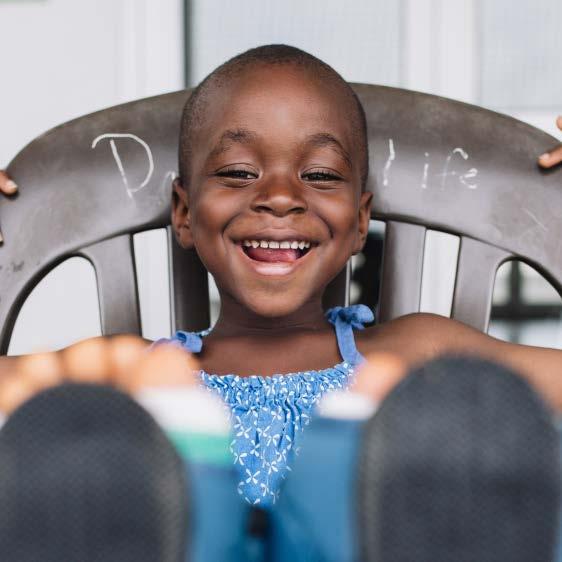
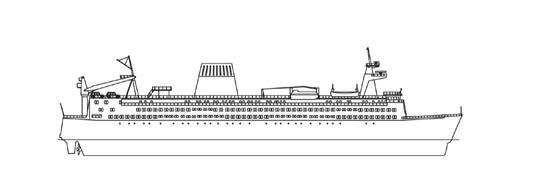
The Africa Mercy
5 operating theatres
80 patient beds including: recovery, intensive care, and low dependency wards
Draft 6.0m
Length 152m
Breadth 23.7m
Gross Tonnage 16,572
These stories from our efforts around the continent of Africa would not be possible without you.
Dear Friends,
Mercy Ships, much like the rest of the world, has been through a storm like no other. The impact of COVID-19 in all aspects of life is apparent all around us. However, despite the many setbacks throughout this year, our mission of hope and healing has not stopped.
During this unique time, Mercy Ships has focused its energy on expanding existing and nurturing new partnerships with several countries in Africa. Thankfully, we have many long-established relationships with partners with whom we could increase our support throughout this year and many lives have been changed as a result.
The Africa Mercy has also been undergoing a transformation during this time — receiving maintenance and updates that will add invaluable years to its lifespan. More years means more hope and more healing for those who need it most.
We are thankful for the opportunity to utilise these avenues of healing and look forward to their continued growth and the return of the Africa Mercy to Senegal, in 2022. We are also looking forward to the addition of the Global Mercy to our mission once it’s finished the equipping phase.
I hope that as you read the following pages of our annual report, the stories of transformation and partnership continue to fuel your passion. These stories from our efforts around the continent of Africa would not be possible without you.
In 1990, Mercy Ships turned our attention to sub-Saharan Africa where nearly 93% of the population lacks access to safe, affordable, and timely surgery. Since then, Mercy Ships has conducted 41 field services in 14 African countries, most of which are ranked by the United Nations Development Index as the least developed in the world.
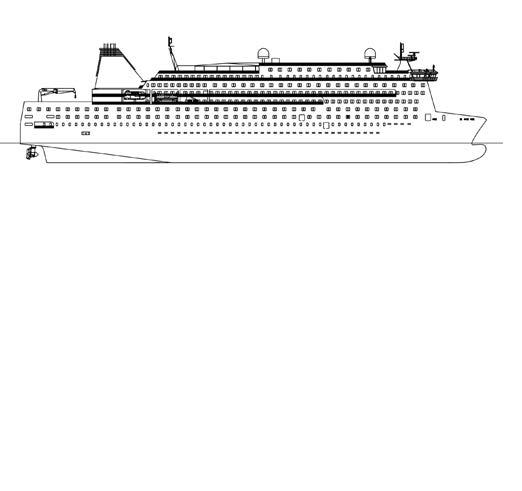
The Global Mercy
6 operating theatres
102 acute care beds
7 ICU/isolation beds
90 self-care beds
Draft 6.1m
Length 174m
Breadth 28.6m
Gross Tonnage 37,000
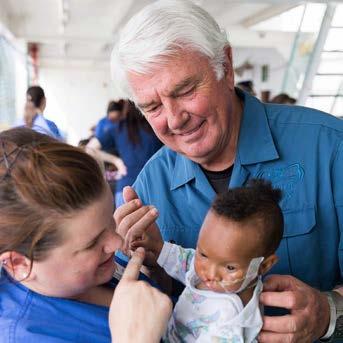
We deeply thank all of those who have made this year a banner year of service. We especially thank all who have stood beside us during this time of trial.
We are looking forward to all the possibilities that lay ahead — Thank you.
Following the model of Jesus,
 Don Stephens Founder of Mercy Ships
Don Stephens Founder of Mercy Ships
Mercy Ships UK’s 25th year was fittingly brought to a close by our annual, COVID-19 compliant, carol service in Southwark Cathedral which, despite the pandemic, saw the main body of the cathedral filled once again with our supporters, volunteers, staff and friends. The cathedral buzzed not only with the lifechanging stories of our patients but also from our amazing, faithful volunteers.
With the ever-increasing generosity of our donors and partners and the dedication of our volunteers and staff, we have never been more well equipped to respond to the diseases of poverty and the lack of adequate and accessible safe surgery. Even without the benefit of our ships in field service during 2021, Mercy Ships has still been able to deliver the equivalent hours of beneficial voluntary service, whether locally within the countries we serve or by using technology to best advantage.
Because of your generosity and commitment, we continue to have been able to achieve much. We have doubled our income within the last six years, we have taken delivery of our new hospital ship the Global Mercy, we have launched a successful vaccinations COVID-19 campaign and broadened the awareness of our activities through new media partnerships and platforms and we have achieved a more diverse and inclusive membership to reflect the many strands that come together to sustain a cohesive, relevant and committed governing board.
Having purposefully chosen to follow best practice, including maximum terms of office for trustees, there were several retirements from the Mercy Ships UK board in 2021. These included Dr Keith Thomson (a founder trustee), Andrew Billington, Anthony Dunnett (Deputy Chair) and Peter Ewins (Hon.Treasurer). Sadly, following his retirement, Peter Ewins passed away in the Autumn after a short illness. I pay tribute to each one of them for their immense contribution and diligence over many years.
We welcome Dr Michelle White and Ade Adeyemi as a new trustees. Dr White is a notable and experienced anaesthetist with many years of volunteer operational leadership with Mercy Ships in the field. Adebusuyi (Ade) Adeyemi is a Global Health Policy Expert who works as a Director of a Fellowship programme at the Think Tank Chatham House, where he supports Ministry of Health stakeholders across Africa, by strengthening their leadership and policy development capacity. As I step down from the Chair in March 2022, I am delighted to announce my successor as Chair of the Mercy Ships UK board, Dr Michael Spence CA, who is currently the President and Provost of University College, London. Dr Spence brings a wealth of relevant experience and leadership together with a compassionate heart for the marginalised and needy.
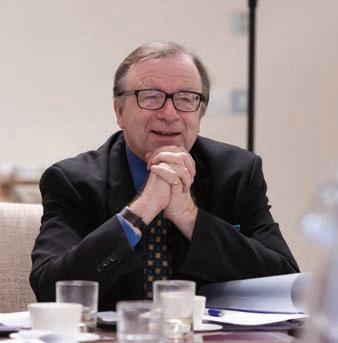
In signing off after 32 years of governance service to Mercy Ships UK, I want to put on record my thanks to so many donors, supporters, partners, volunteers, fellow trustees and staff for making Mercy Ships UK and the greater Mercy Ships global mission what it is today. I am personally heartened by one of our current slogans: “Once a Mercy Shipper always a Mercy Shipper”. This is what I have found to be true over the years and a particular characteristic and hallmark of the Mercy Ships family. The commitment and verve I experienced upon my first contact with Mercy Ships has never dimmed as we continue to put our patients and their health transformation above all else.
 Henry Clarke Chairman, Mercy Ships UK
Henry Clarke Chairman, Mercy Ships UK
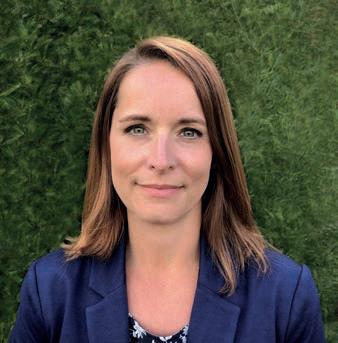
You made 2021 our strongest year to date. Despite the pandemic, Mercy Ships and our supporters continued to deliver accesible, free surgical care and medical treatment to those in unjust poverty and urgent need. Mercy Ships UK’s staff continue to prove their adaptability and resilience to the ever-changing COVID-19 situation, and I am very proud of the team and their impressive performance despite the challenges.
In the last year, Mercy Ships has deepened our commitment and partnership with Africa. We are Together with Africa in all we do and work to support and empower local healthcare professionals, you will read about many of these partnerships in the following pages. In total, Mercy Ships performed over 11,000 surgical and dental procedures and trained more than 700 local medical professionals throughout 2021.
I am pleased to say that 2021 was another year of growth. Both in partners and income. Mercy Ships UK’s annual turnover grew to £9.3m. Our relationship with Senegal continued to deepen. Mercy Ships hosted the Senegalese ambassador at our US HQ and Senegal’s president His Excellency Macky Sall, helped to waive the Suez Canal fee for the transit of the Global Mercy. The Global Mercy nears operational readiness having completed its maiden voyage from China to the Netherlands, where its hospital is being fitted ahead of its first field service. In the coming months, the Africa Mercy is expected to return to Senegal to finish the medical and surgical programmes that we started in 2020, in addition to starting many new training programmes.
I am filled with admiration and gratitude for every faithful supporter who helped to make this work possible and for each volunteer who offered their time and professional skills so generously and with such dedication during another challenging year.
As we move into 2022, I trust that this report will inspire you and that you will continue to support us. Through your donations and your partnership, you bring hope and healing to those in desperate need and help to empower nations to look after their own people. Thank you for being a part of this journey – the best is yet to come.
Thank you for being a part of this journey –the best is yet to come.Joanne Balaam Chief Executive Officer, Mercy Ships UK
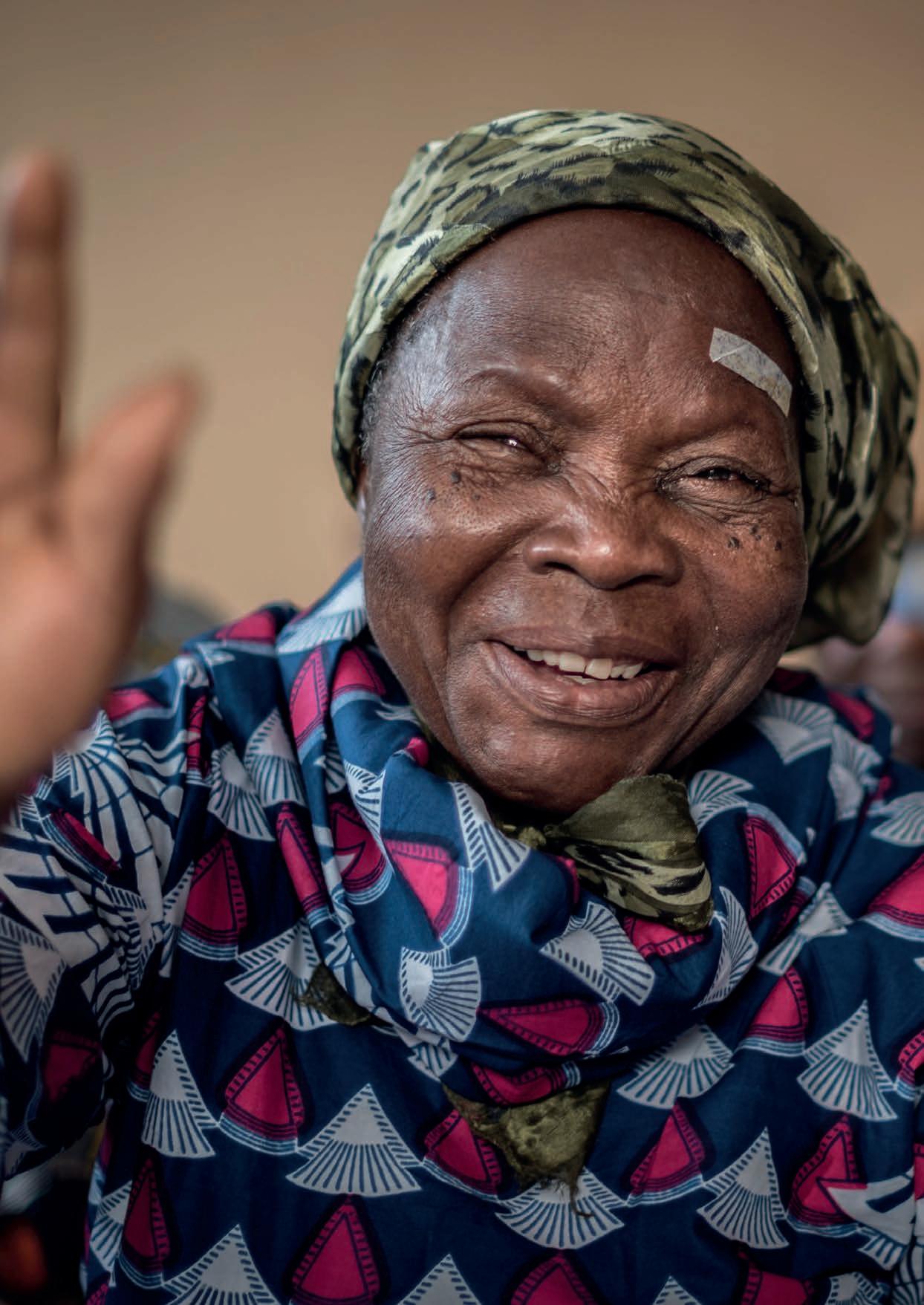
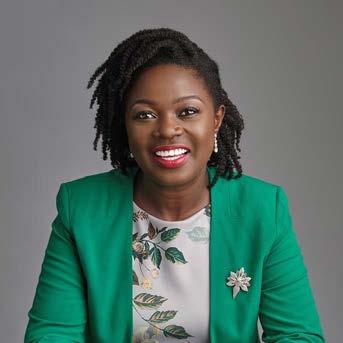
As 2021 comes to an end, we celebrate the passage of another incredible year as an organisation. This year looked unlike any before it, yet together with our partners across Africa, we rose to the challenges and found innovative new ways to bring hope and healing. Through programmes in 11 different African nations, Mercy Ships kept striving to meet its goal: to help as many people in 2021 as during a normal year.
People like Hounsigbo, a 70-year-old woman blinded for years by cataracts, can now see, thanks to an operation sponsored by Mercy Ships and performed by former trainee and current partner, Dr Wodomé, in Togo. Another example is of medical professionals in Liberia who received vital training in neonatal resuscitation, among other areas, thanks to our collaboration with a local training hospital. And in our dental clinic in Guinea, young dentists continued honing their skills and preparing to bring life-changing care across the country thanks to the partnership of those at the Gamal University. Our work continues to positively change lives and impact communities. Of course, all these successes were only possible because of the strong relationships we have built across a number of African countries with governments and healthcare leaders who are deeply committed to seeing their surgical care systems grow. We are thankful to be invited as part of the journey and celebrate transformations together. The innovations and initiatives we see taking place in our partner nations is exciting to see. And with the addition of the Global Mercy to our fleet in the next year, this is only the beginning.
Lucy Quist
Mercy Ships International Board Member
Named Among Humanitarian Awards Global’s 100 Most Influential Change Makers in Ghana
During the pandemic, Mercy Ships was ideally placed to adjust and ensure that we continued to transform and change lives. 2021 found Mercy Ships working on the ground throughout Africa, deepening and developing new partnerships to provide critical capacity building, training and mentoring, infrastructure projects, and investing in people and equipment across the continent. We were also providing multi-country online opportunities and direct patient care designed to support and strengthen healthcare systems in the nations we serve.
Despite the challenges Mercy Ships was determined to help as many people as we do during a normal field service. Thanks to partnerships with other organisations and Ministries of Health, ongoing training programmes, and direct medical care in several of our partner nations, Mercy Ships is grateful to have met – and even surpassed – this goal. It was only possible together.
As we prepare for a historic year in 2022 with two ships in service in Africa, we look ahead to the future with great hope and anticipation. We’re welcoming crew from around the world, preparing our newest vessel for her first field service, and preparing for a year filled with transformation like never before.
The Sustainable Development Goals (SDGs) are the UN’s blueprint to achieve a better, more sustainable future for all. They address the global challenges we face, including health. Ensuring healthy lives and promoting wellbeing for all at all ages is important for building prosperous societies and working towards all of the UN’s SDGs.
The work of Mercy Ships contributes towards directly towards SDG 3, Good Health and Well-Being. Together, we can end the global surgery crisis.
Everything we do, we do together with Africa. Through empowering partnerships with local healthcare professionals and similar NGOs Mercy Ships works to strengthen local healthcare systems. Together with our African partners, we are creating sustainable, holistic change.
The following graphs show what we accomplished in 2021, with the help of our partners in Africa.
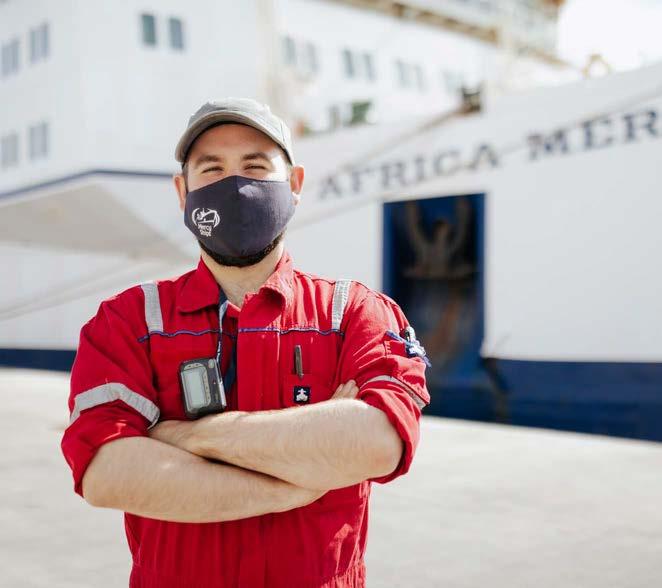
3,138
Courses presented and total number of participants:
Dental
Neonatal
Sterile
Clubfoot
Sterile Processing
Ultrasound Courses
SAFE
SAFE
2,526 Dental procedures
16,067 Basic oral health instruction
Surgeries by country
1,819
1,343
Medical capacity building participants trained
157,812
Total number of participant training hours
Participant numbers by country:
134
650 Liberia
This was an historic year for Mercy Ships, as our first purpose-built hospital ship, the Global Mercy, completed construction and officially joined our fleet. Building a ship during a global pandemic meant overcoming many obstacles, but we persevered with one vision in mind. Through our new vessel Mercy Ships will be able to double our impact in host nations.
When 2021 began, the vessel was in Tianjin Xingang shipyard in China, completing the final stages of her construction under the expertise of our partner, Stena RoRo.
On 30th April, we celebrated as she completed her third and final set of sea trials, marking the Global Mercy as officially seaworthy.
On 16th June, Mercy Ships representatives, officials from the shipyard and partnering organisations gathered to celebrate the completion of the Global Mercy’s construction. The new vessel was officially ours! “This day is a dream come true — not only for us, but for those we serve,” said founder Don Stephens.
Shortly after, she set sail to the open seas for the first time as she began her delivery voyage from China to Belgium. Along the way, the vessel made several key stops:
The ship sailed through the Suez Canal, where she was granted free passage thanks to the generosity of the government of Egypt. This gift was coordinated by our partners in Senegal, including His Excellency President Macky Sall.
Next, on 2nd September, the Global Mercy paid a visit to Malta, the nation where she is flagged.
On 12th September, the Global Mercy arrived in Antwerp, Belgium, where she will remain for equipping until early 2022. Next, she will sail to the Port of Rotterdam to welcome visitors aboard before finally living out her purpose with her first field service in Africa.
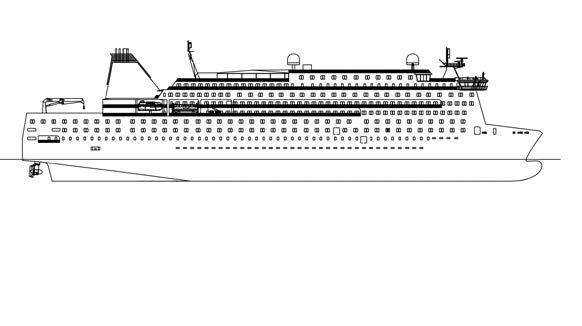
Mercy Ships Decides to Build a New Ship
13 Dec 2013
Mercy Ships Signs the New Ship Contract
16 Sept 2015
Keel Laying in China
30 April 2021
Passes Final Sea Trials
16 June 2021
Delivery from Shipyard
Q1
Equipping and PR events in Europe
Q2
Planned Sail to Senegal for Africa Celebration and field service
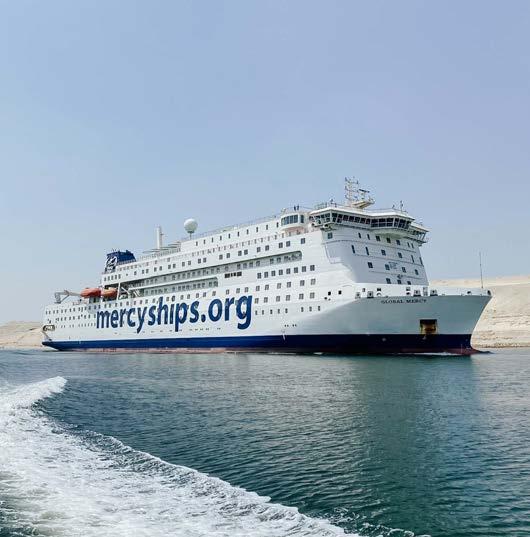
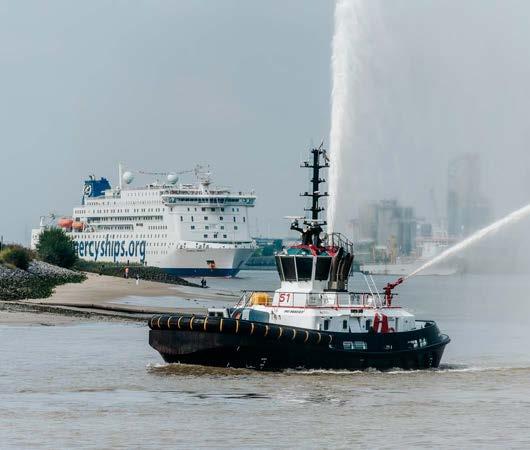
Mercy Ships is committed to environmental sustainability, including:
Low sulfur marine fuels help reduce contaminants
Sailing at low speeds between ports to reduce carbon emissions
Filtering AC condensation for technical use, reducing potable water use by 50%, and using high-efficiency systems to reduce energy consumption by 15%.
Complying to international (MARPOL 73-78) standards, which regulate what ships do with waste, oil, sewage, garbage, and air pollution Energy-efficient LEDS in light fixtures
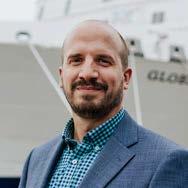
Joff Williams spent his childhood in Zimbabwe, watching his parents use their skills with The Salvation Army. His childhood experiences were formative: “It opened my eyes to a lot of realities about what it means to live in Africa, and both the beauty and the challenges of the continent.” Now, decades later, Joff is stepping into a new role as the Managing Director of the brand new Global Mercy a role he weighs as an incredible blessing as well as responsibility.
“As an organisation, we have a tremendous opportunity here to send a message with the Global Mercy… that people are valued and that we should be serving each other. That's a big part of the reason we exist on this earth, is service to each other and following Jesus.”
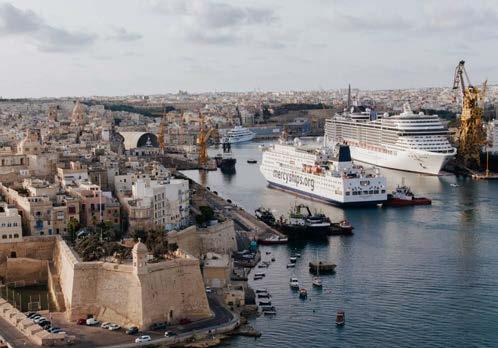
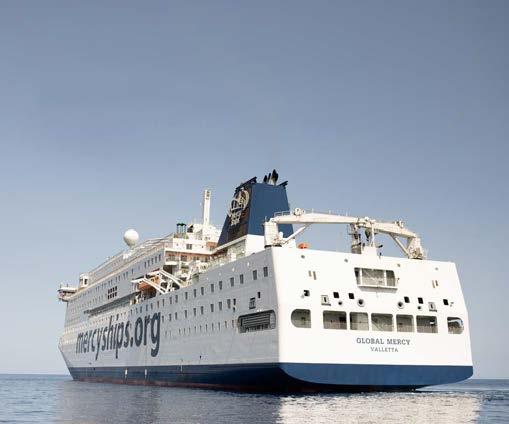
While the day-to-day life onboard the Africa Mercy looked very different in 2021 due to COVID-19, some constants remained. Volunteer crew continued to keep every part of the ship running, from the bridge and the engine room to the Academy onboard. More than 420 volunteers joined the Africa Mercy – some for just a few weeks, and others for the entire year.
Mercy Ships smoothly pivoted through the pandemic and brought forward the planned refurbishment of the Africa Mercy. This essential work will extend the ship’s operational life and ensure that it is fit for purpose for many years to come.
Volunteers worked hard throughout the pandemic, alongside shipyard workers, to refurbish the ship. They used about 49 tons of paint, replaced 120 windows, blasted and painted over 14,000 tanks, and upgraded the main engine, among many other projects.
Now, after this vital refit, the Africa Mercy is preparing to return to Senegal.
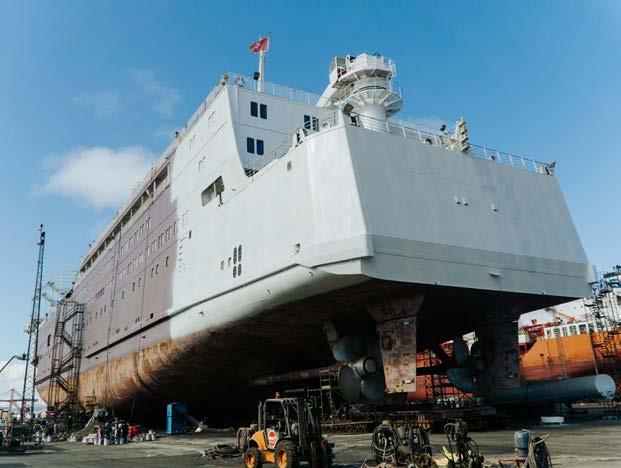
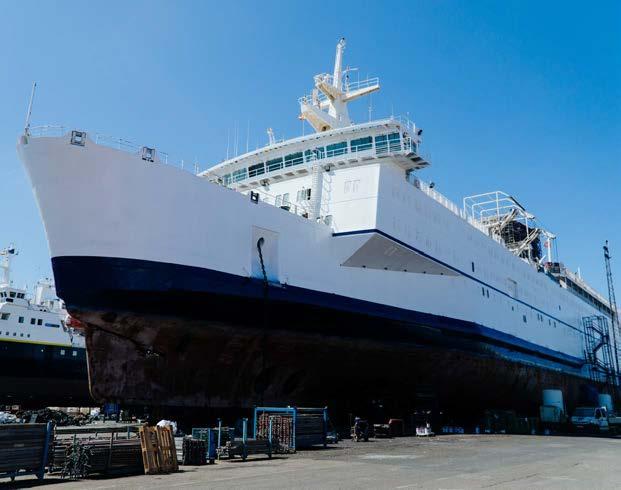
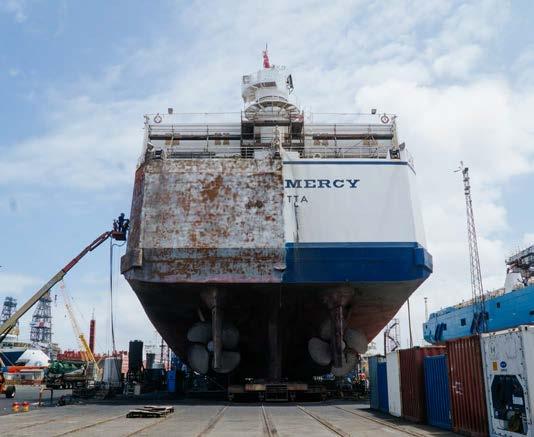
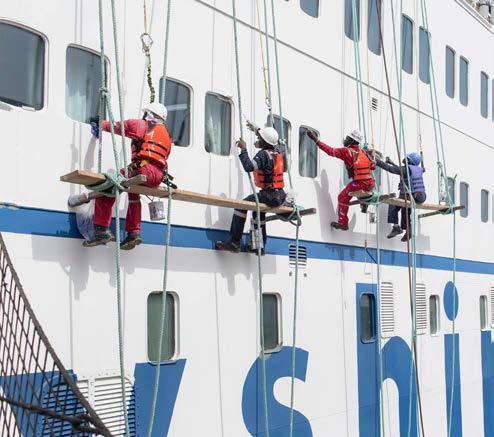
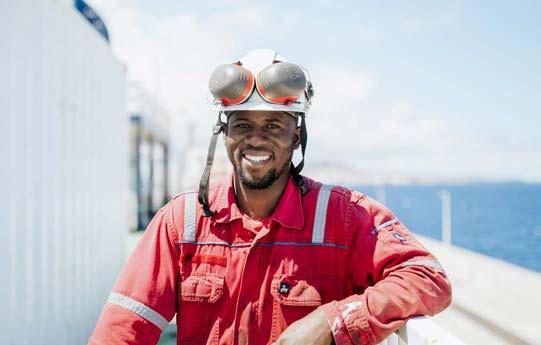
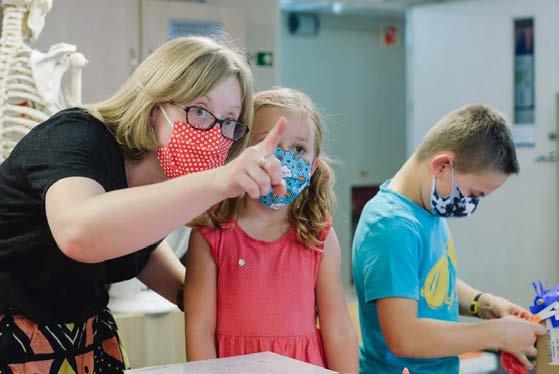
Over the last year and a half, Managing Director Bernard van den Bosch led the Africa Mercy through an unprecedented moment in history. It began in March 2020, when most of the world locked down due to COVID-19. “There’s a picture of all those people standing in a row on the dock… 200 crew left all at once… that was a rollercoaster,” he remembers.
Since then, the remaining crew onboard have been anxiously awaiting the day they sail back to Senegal to complete the interrupted field service. “There [were] lots of things you [weren’t] not in control of, so I had to learn to trust God more,” he says.
Bernard recalls the Saturday morning when those onboard the Africa Mercy learned the ship would not be able to return to Senegal in July as originally planned.
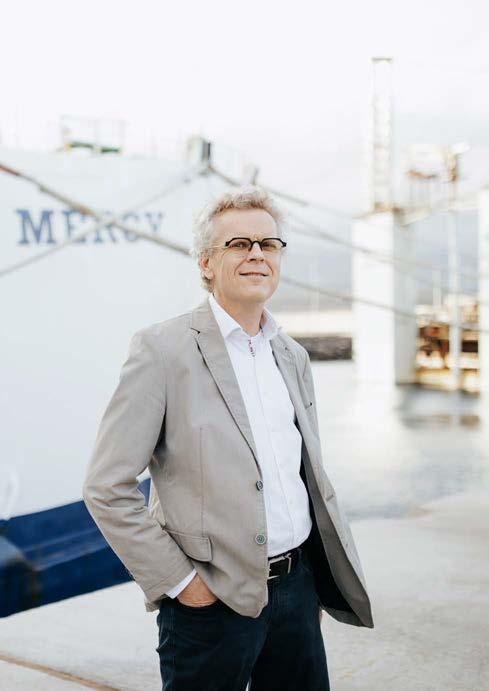
“I gathered the crew and of course, we prayed, and I tried to put it in perspective.” During that gathering, Bernard read Psalm 91, which reminds us that even in times of great disappointment, “[The Lord’s] faithfulness is a shield and buckler.” (Psalm 91:4, ESV).
This faithfulness has carried Bernard through the challenges of leadership during a season filled with unknowns. Like the rest of the organisation, he is eager to return to Africa. He has kept his gaze on the original mission of Mercy Ships: bringing hope and healing to those who need it most. Now, as 2021 draws to a close, he cannot wait for the promise of the return to be fulfilled – not just for the volunteers who will serve in Senegal, but for the patients who have been patiently awaiting their surgery onboard: “There’s really a new hope.”
In response to the pandemic, Mercy Ships created an internal COVID Medical Advisory Group focused on adapting to the latest medical information and creating safety-focused, responsible policies. These health and safety policies continue to be instrumental in bringing both our ships to Africa safely. All decision-making was based on data-driven information provided by reputable medical organisations, such as our partner the World Health Organisation.
Together with our partners, Mercy Ships was able to secure vaccines for volunteers, as well as local day crew in Senegal who don’t have access to the vaccine and future patients who wish to be fully vaccinated against COVID-19.
Mercy Ships also donated £2.2 million to support COVID-19 vaccine delivery, education campaigns, and training of local healthcare professionals to administer vaccines in West and Central Africa.
This year, with the help of generous partners, Mercy Ships donated and delivered 817,300 units of PPE valued at more than £821,000.
Mercy Ships was well placed not to let the pandemic stop our vital work. We started new partnerships and deepened existing ones to ensure that the work was able to continue, safely. Mercy Ships was working with new and existing partners in Liberia, Togo, Guinea, Malawi, Uganda, Niger, Zambia, and Ethiopia.
Mercy Ships worked with our partners and supporters to raise over £631,380 (at time of writing) to help vaccinate the most vulnerable people in Central and West African nations, including Senegal, Benin, Guinea, Liberia and Sierra Leone. This also funded training of more African doctors and nurses to administer the vaccine and to spread the news about the free vaccine to rural and remote communities.
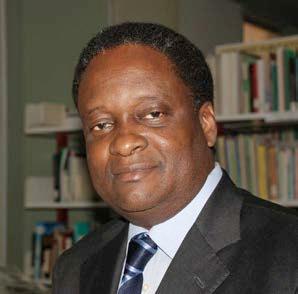
“Leading the Africa Bureau [during the pandemic] was very tough. But we seized the opportunity and made sure that we can support African countries to deal with the COVID-19 response together.
We had a plan, and we implemented the plan by making donations of more than 1.2 million pieces of PPE to 11 countries. That was with the aim of protecting our counterpart health workers.
We also have a special partnership with UNICEF about the vaccine in Western and Central African countries. We also supported Senegal through a donation to support their national response against COVID-19. The pandemic demonstrated that we need to support Africa to strengthen the healthcare systems. We now have a ship with all the facilities to not only provide free surgeries, but also to focus more on capacity building and make sure that we bring African colleagues to do surgery on board. We work as a team. It’s kind of a dream.”
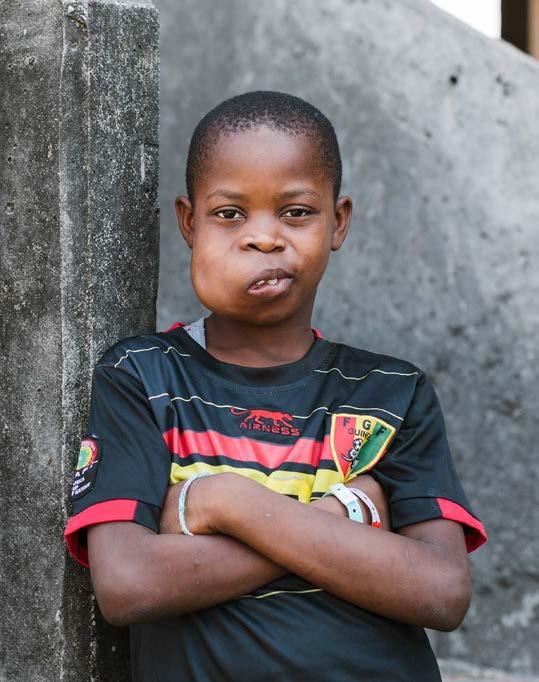
It was just an ordinary morning when 10-year-old Sekouba first noticed a tiny lump in his mouth, no bigger than a button. He showed it to his mother, M’mahawa, who told him not to worry.
“Maybe it will go away on its own,” she said.
But it didn’t. Over the course of the next year, the lump grew, eventually forming a tennis ball sized tumour filling Sekouba’s cheek.
People began to taunt him, asking, “What’s that in your mouth?”
To shelter himself from the endless teasing and stares, Sekouba dropped out of school and confined himself to his home.
Every day for nearly two years he would wait anxiously for his brothers to return home from school so that he could continue to learn.
The family was at a loss for what to do before they heard about a hospital ship coming to their country. He and his mother traveled three days to where the Africa
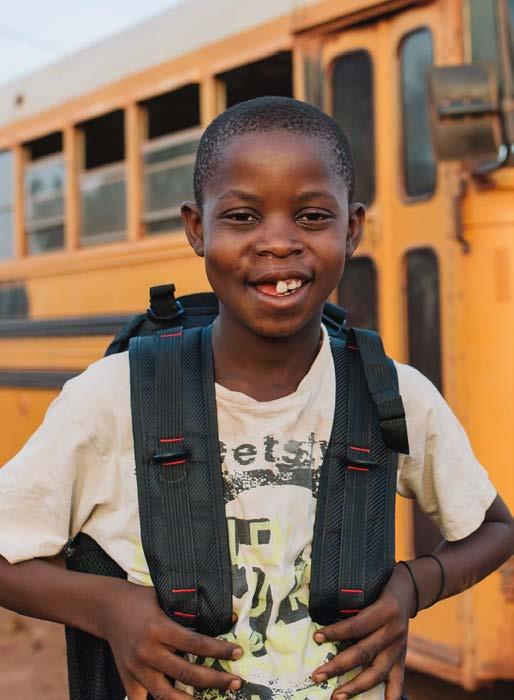
Mercy was docked in search of help for his condition, but Sekouba held out hope.
After surgery, the sight of Sekouba’s healing face brought his mother endless joy.
“Every time I pray, I thank God for this ship,” M’mahawa said. “I don’t know what we would have done without it.”
In 2021, two years after his surgery, Mercy Ships had a special opportunity to see how Sekouba was doing. Reflecting on his experience, Sekouba said, “Before the surgery, my friends were laughing at me. I was not going to school… After the surgery, people are happy to have me here. I started school again. When I finish my studies, I [would] like to be a doctor.”
“ Every time I pray, I thank God for this ship.”
“I saw a difference in my life before and after,” Sekouba continued. “Before the surgery, nobody was approaching me, but after the surgery people were coming close to me! I was happy… because I was healed.”
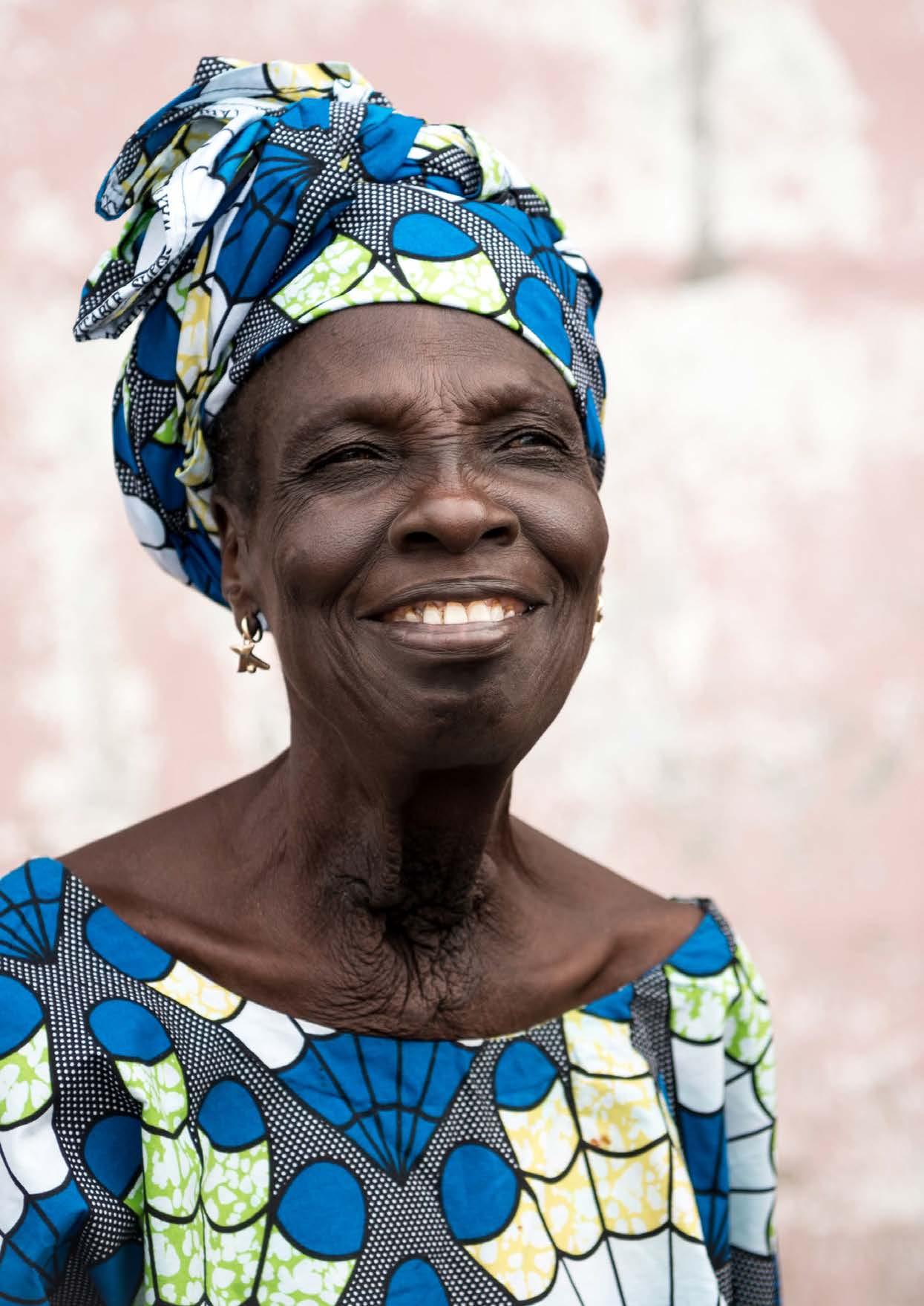
During the pandemic Mercy Ships supporters worked hard to provide vaccines for the continent. Mercy Ships ran an Emergency Vaccines for Africa appeal.
Your support has provided vaccine doses to protect the vulnerable, like Adzia, a grandmother in Benin. Grandmothers play a vital role in many African households, caring for and nurturing grandchildren. Adiza previously had surgery to remove a large tumour in her throat onboard our hospital ship the Africa Mercy when the ship visited her country.
You have helped deliver 7.4 million doses of the vaccine in the West and Central African region. This is enough to help protect millions of healthcare workers, the elderly and the most vulnerable patients from the worst effects of COVID-19. You have saved countless lives - thank you!
The Emergency COVID-19 Vaccines for Africa campaign had three aims:
1. Deliver
Deliver vaccines to key workers and vulnerable people in West and Central Africa
2. Train
Train healthcare workers to administer the vaccines
3. Share
Share the news about the free vaccines to rural and remote communities
“In the fight against the virus, we are all in this together.”
António Guterres, The Secretary-General of the United Nations
This is what you helped make possible:
1. Deliver
7.4 million doses of COVID-19 vaccines have been shipped, enough to fully vaccinate nearly 4 million people.
2. Train
Nearly 14,500 health workers have been trained across more than 1,000 vaccination sites in West and Central Africa.
Just over 9,000 community health workers have been trained on how to engage their communities to provide information on COVID-19 vaccines.
3. Share
8.9 million people reached with information about COVID-19.
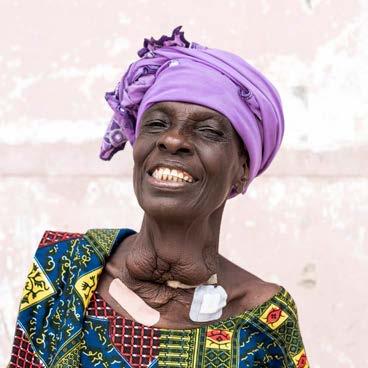
“ We are so thankful for all that was done for our family.”
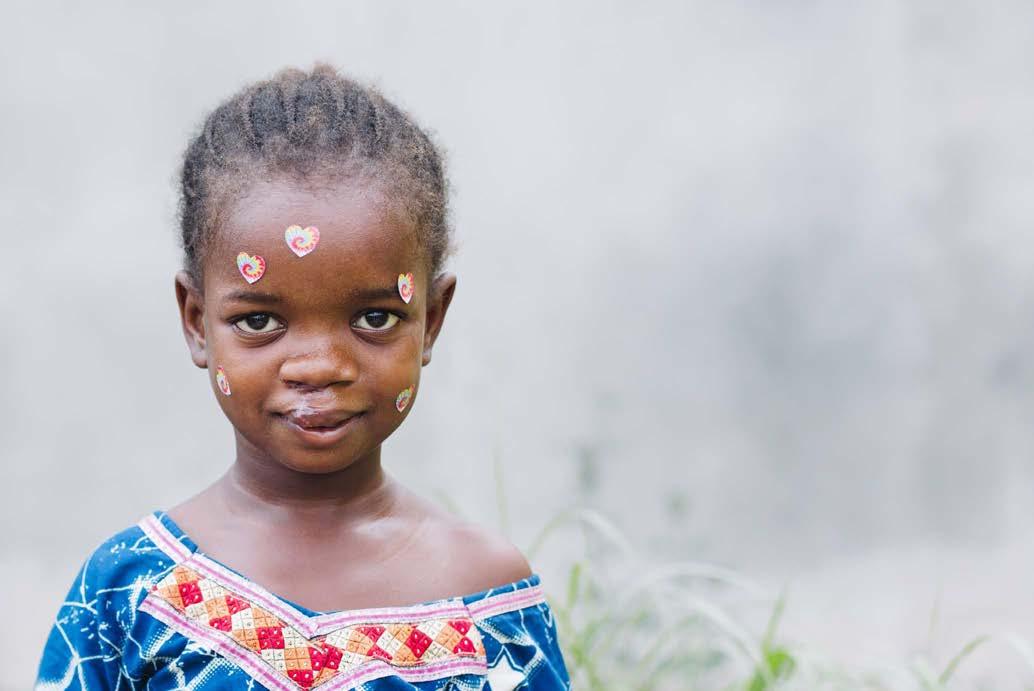
Ousman was excited to receive the call from his sister saying that his niece had finally been born. However, that excitement quickly turned into heartache once he learned that baby Aminata had been born with a cleft lip.
As she grew, young Aminata’s condition began to cause malnutrition, making her body develop very slowly. At eight years old, Aminata’s height and build resembled that of her four-year-old cousins. Because she was ashamed of the way she ate, she refused to eat in public and instead, would only nibble on meals that were placed around the house for her to find.
After eight years and several failed attempts to find a solution, the family had all but given up – until Ousman heard an advertisement on the radio about a ship that offered free surgeries.
Once Aminata was accepted as a patient, Ousman was excited to make the call to his sister letting her know the fantastic news — Aminata was going to receive surgery! Following the surgery, Aminata was able to heal
knowing that her family had never given up on her.
“To give up hope would be the end,” Ousman said. “We did not think about what would happen if she did not get surgery. We held on to the hope we had... Now, she has so many more opportunities, and we are so blessed. We are so thankful for all that was done for our family.”
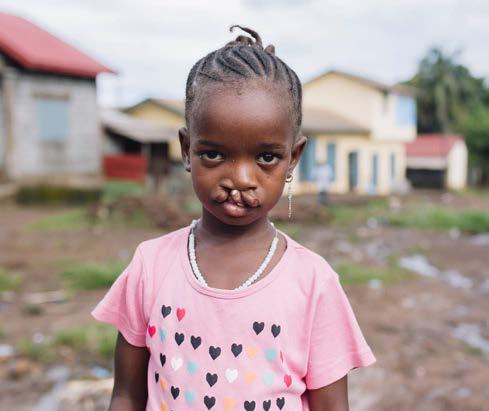
21,965 650 Participants trained
Participant training hours Courses provided to participants:
Anaesthesia Mentoring: 41
Biomedical Technician Mentoring: 33
MCB Surgeon Mentoring: 4
Nurse Mentoring: 41
Lifebox: 268
Mental Health: 119
Neonatal Resuscitation: 103
Nurse Training: 29
Nurse Training: Training of Trainers: 8
Paediatric and Surgical PUMP: 20
Sterile Processing: 5
With a country engagement team on the ground in Liberia this year, Mercy Ships was able to launch and deepen many exciting partnerships. Education was a high priority focus for our programmes in Liberia. Over the course of the year, we offered several training courses, including biomedical technician training, neonatal resuscitation, and basic life skills courses.
Mercy Ships also partnered with a local hospital to donate needed anaesthesia equipment and surgical care. Mercy Ships volunteer ENT surgeon, Dr. Doug Schulte, performed 249 surgeries by the end of the year, greatly helping to reduce the surgical backlog formed during the pandemic. Two Mercy Ships volunteer nurses also shared their time and skills to provide care and nurse mentoring to participants like Pris Senah, a registered midwife.
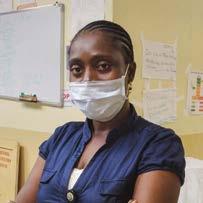
“ Sometimes you learn something and then you no longer do it,” she said. “This helped remind us what we should do. I will use [the neonatal resuscitation training] regularly with complicated babies to save the baby’s life.”
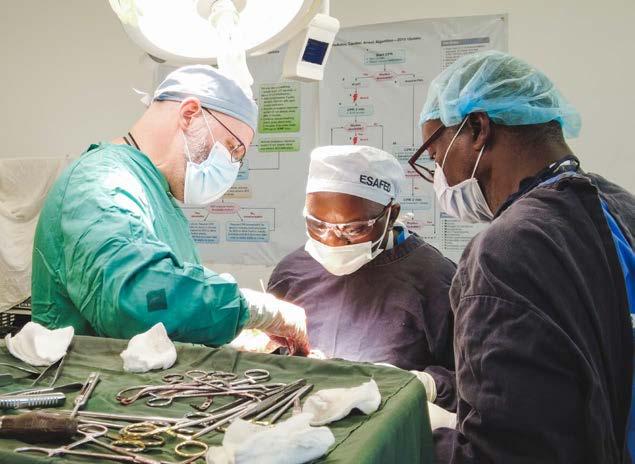
TogoMercy Ships was active in many projects in Togo this year, including providing a Mental Health training programme as well as supporting our long-time partner, Dr Abram Wodomé, in establishing his new cataract surgery training institute. Mercy Ships also sponsored 1,000 cataract surgeries through a partner organisation, Sight.org.
Dr Abram Wodomé is an ophthalmologist in Lomé, Togo. A decade ago, he completed a mentorship onboard the Africa Mercy. After learning alongside Mercy Ships volunteer eye surgeons, he caught a passion for charity work and opened a clinic of his own where he continues to perform free cataract surgeries and train other Togolese surgeons.
In 2012, Mercy Ships donated essential training equipment to Dr Wodomé and his clinic. In addition to the training he received on board, this donation has enabled him to bring more sight to people blinded by cataracts. As Togo’s leading cataract surgeon, Dr Wodomé provides thousands of surgeries every year to visually impaired patients. Many of these surgeries are performed entirely free of charge.
“The future of eye surgery in Africa looks very bright because more and more people are interested in quality training. It is the basis of everything. When the training is of good quality, the surgery gives good results, and the patients are confident about their practitioners. I think that over the next few years, Africa is promised a better future.”
Because of the skill and commitment of Dr Wodomé, his team, and Mercy Ships medical capacity building programme and donations, his patients have the hope of restored sight and fulfilling their dreams. Partnerships like this lead to long lasting impact and help make progress towards our goals and those of the UN’s SDG 3.
“ I used to say, ‘if you give someone fish to eat, you feed him for a day. If you teach him to fish, you feed him for his whole life. But if you teach people how to teach other people, then you feed a village for a whole generation.’”
Dr. Wodomé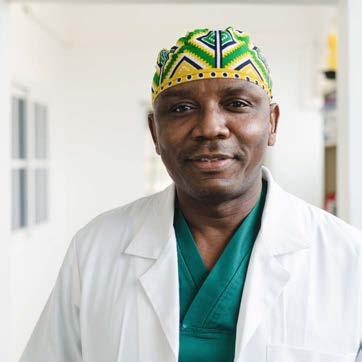
4,763
112 Participants trained Participant training hours
Courses provided to participants:
MCB Surgeon Mentoring: 4
Mental Health: 108
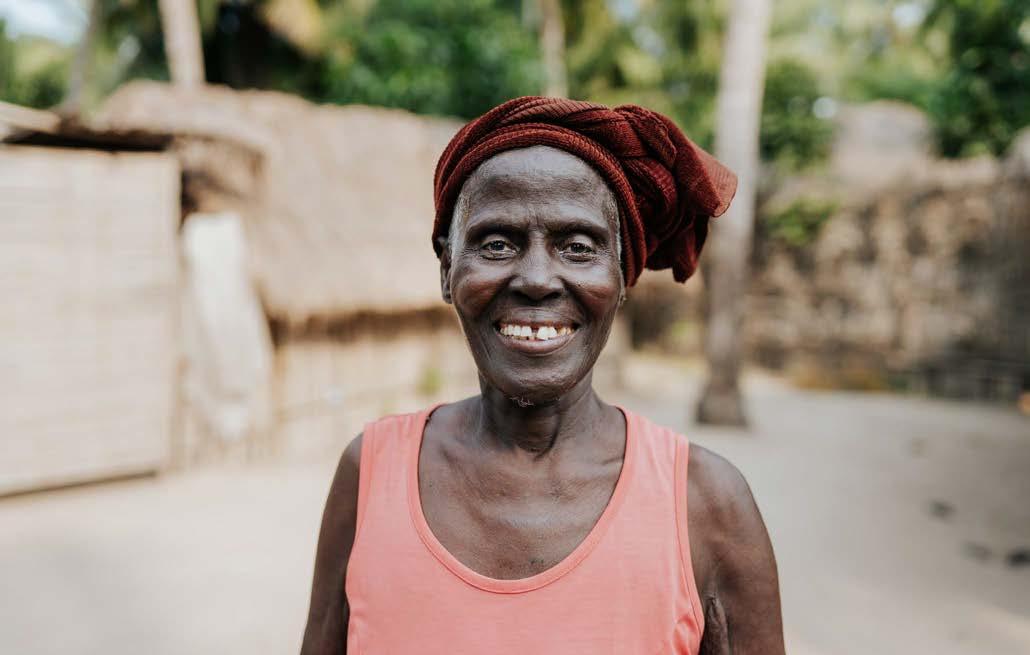
1,819
ophthalmic surgeries completed in Togo in 2021:
Togo cataract surgery teaching institute: 410 410 762
Cataract surgery campaign: 762
647
Sight.org partnership: 647
For more than three years, Hounsigbo lived in total darkness, cataracts clouding her vision in both eyes. Before, Hounsigbo had been busily working in her village in Togo, going every day to the forest to cut trees and weave mats out of their branches, selling them to earn a living. But now, the 70-year-old spent her nights and days in a small room in one of her children’s homes, completely dependent on her family to survive.
That’s where Dr Abram Wodomé comes in. In a city not too far from Hounsigbo, this surgeon restores people’s sight in a mere seven minutes. For years, Mercy Ships has been partnering with him, sponsoring surgeries at his clinic for people who might otherwise not have access.
Hounsigbo had heard about Dr Wodomé’s clinic, but she doubted she could afford it. Fortunately, her grandson, Louis, was determined to get her help regardless of their financial situation.
Soon, Louis’ faith was rewarded. Hounsigbo was approved for surgery, and before she knew it, she was in Lomé and going into the operating room. The
next day, when her bandage was removed, Hounsigbo immediately laughed out loud, then ran into the next room to give Dr Wodomé a hug. She could see everything!
She is no longer dependent on her children and grandchildren: now, she is free to return to work and take her place as the matriarch of the family. “I have been given grace to live again,” she says.
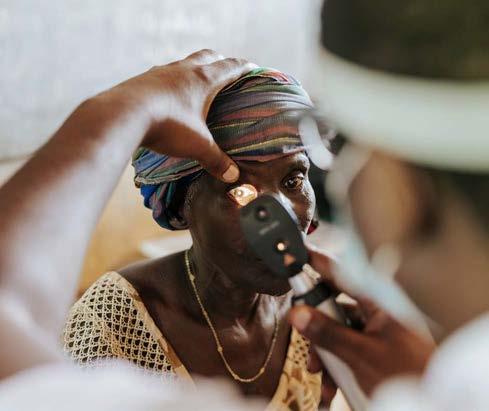
160
37,584
Participants trained Participant training hours
Mercy Ships programmes continued to transform lives throughout this year. Mercy Ships trains participants in sustainable agriculture practices through our nutritional agriculture project, as well as running various essential medical capacity building and infrastructure projects and continuing to support projects through funding donations. We also partner with the Ministry of Health and local hospitals to provide surgeries locally to patients who have been awaiting care.
Courses provided to participants:
Clubfoot
Nutritional Agriculture:
Palliative Care courses: 25
Sterile Processing Courses: 2
Ultrasound Courses: 2
Mercy Ships provided 169 surgeries in Senegal in 2021:
General surgery:
Meet Birima, a student at the Food for Life course, which Mercy Ships runs. Along with a group of more than 30 fellow students, Birma has now been taught a foundation in the world of agriculture, including agroecology, nutrition, and food processing.
But the course does more than just that. It aims to empower the participants to provide for their communities. Now Birima has his own food production business. He started his venture with the equivalent of $40 — and it has already bloomed into a thriving, sustainable local business.
“Having this knowledge allows me to be independent and take care of my own food supply,” says Birima.
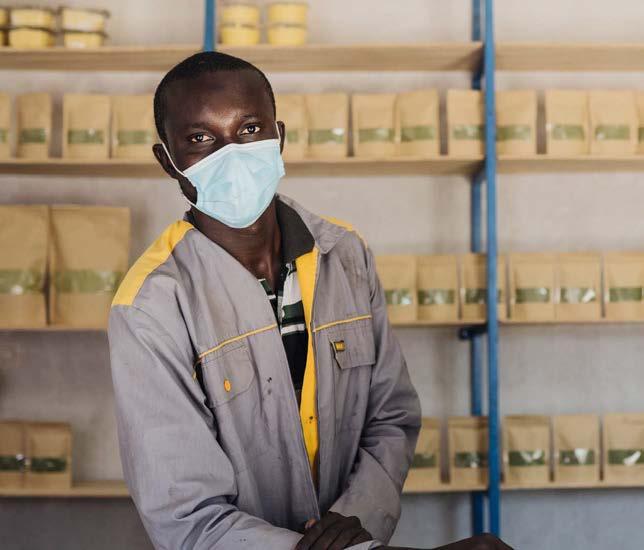
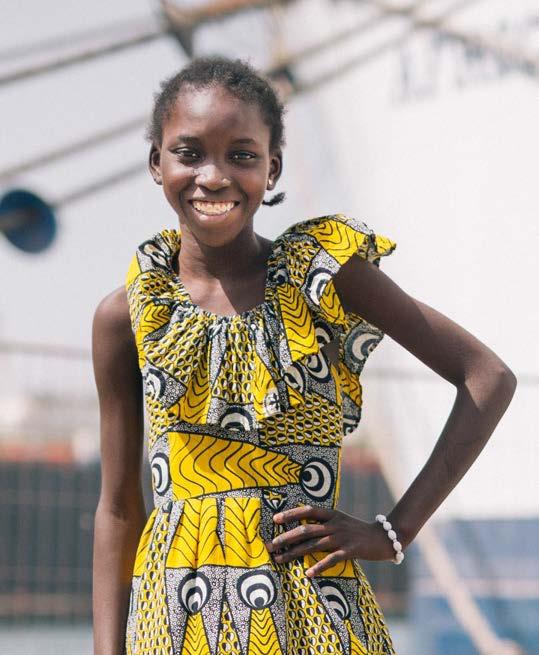
Marie Madeleine always loved school – and refused to let her condition slow her down. As a child, she developed an abnormally tight muscle contracture in her leg, leaving her with a severe limp when she walked. Despite this difficulty, Marie Madeleine continued making the short journey to school.
“My hope is for her to be like every other girl with a backpack going to school,” said her grandmother. “But we couldn’t afford surgery, so we just waited for a miracle.”
One day, that miracle arrived in the form of news from a neighbor in their village, who told them about the Africa Mercy arriving in the Port of Dakar. Soon, Marie Madeleine had a surgery scheduled and an end dream in sight: walking back into school.
“ My hope is for her to be like every other girl with a backpack going to school.”
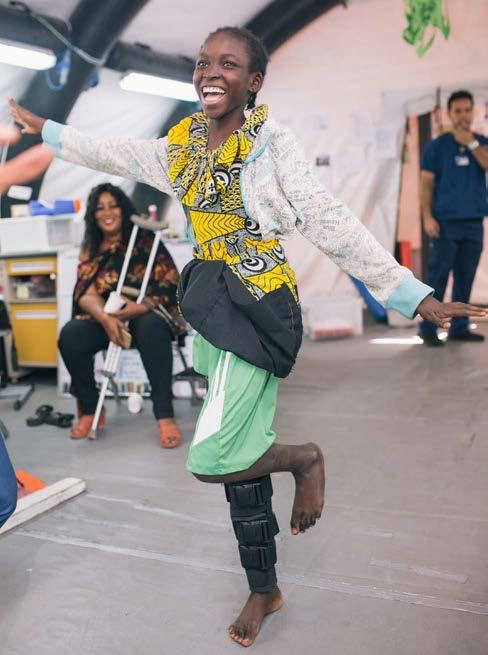
Two years after her surgery, Marie Madeleine is walking better than she had in years. Many things have changed in this bright 14-year-old’s life, but one thing has remained the same — she still loves to learn!
“She is going to school and she says she wants to be a doctor!” says Marie Madeleine’s mother. “She wants to help people back like she was helped.”
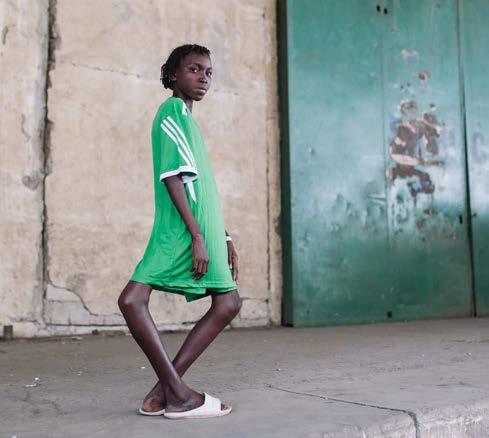
Mercy Ships has been actively engaged in Guinea ever since the Africa Mercy visited in 2018-2019, and this partnership has continued in 2021. This year, some of our key projects included ongoing investments and training at the Gamal University dental clinic and maxillofacial surgery training centre, as well as surgical and biomedical training, infrastructure, and equipment donation projects.
“ Through this programme with Mercy Ships, I realise that the dental field is not a small profession, but a noble one. It is an important part of taking care of community health.”
“This dental programme really helped me to improve in the dental field. Before, we had courses, but we were not that confident in ourselves. When Mercy Ships came, we understood that there is a huge difference between talking about theory and taking practical simulation courses. Thanks to Mercy Ships, today we really recognise ourselves as dentists.” Francois, a student at the Gamal Abdel Nasser University dental school
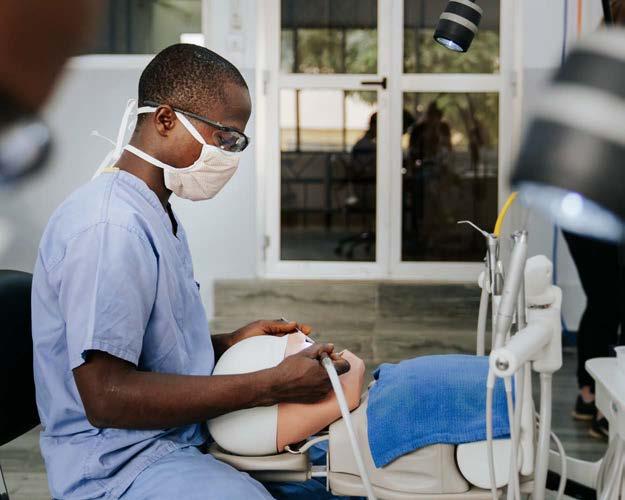
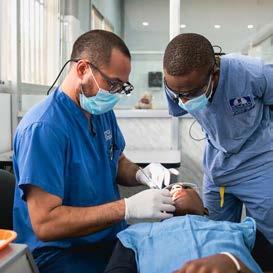
Dr David Ugai first joined the Mercy Ships dental team in 2012. His passion for safe dental care and quality training led him to lead the dental training programme at Guinea’s Gamal University, in collaboration with university leadership and local partners. This year, with the help of Dr David, Mercy Ships continued training 37 future dentists at the postgraduate dental programme in Guinea.
“I enjoy working with students. I enjoy helping them realise their potential and seeing that light bulb go off when they get a procedure right. I can’t do much myself — but if I can teach people to do much, much more, that’s going to make a bigger impact.” Dr David Ugai
134
Participants trained
30,680
Participant training hours
Courses provided to participants:
Dental Partner Unit Mentoring Programme: 37
Safe Surgery: 97
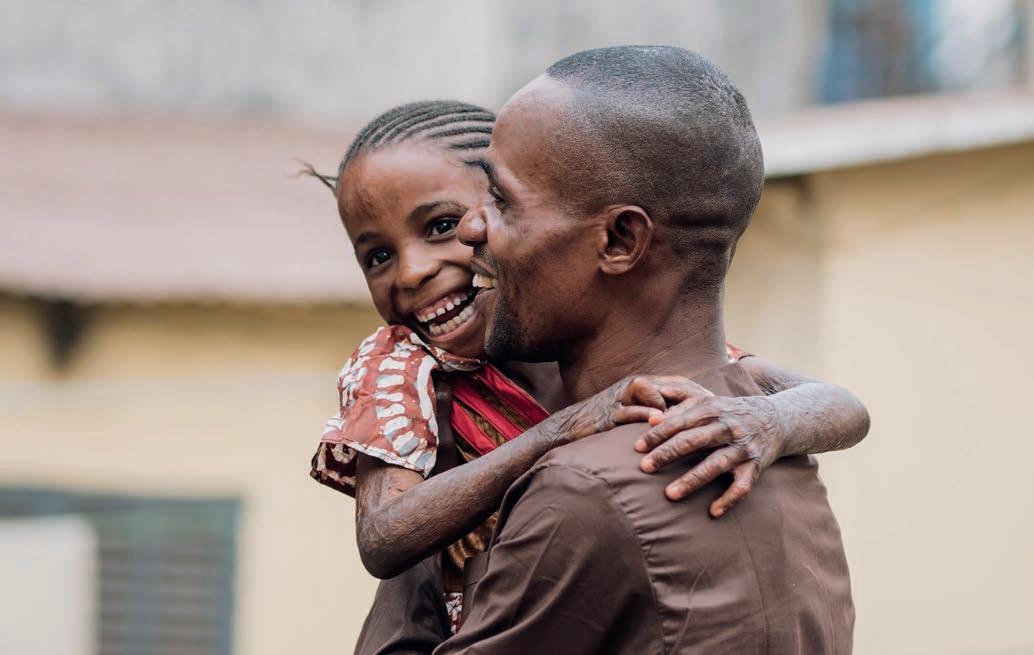
Confort never imagined the morning she put on a pot of boiling water to make some rice for her hungry daughters would be the start of a mother’s nightmare. One-year-old Gamai, who had just started walking, toddled past the pot knocking it over onto herself as she fell. Confort rushed Gamai to the local hospital but was only able to afford some ointment for the pain. Not knowing what else to do, they reluctantly watched their little girl grow over the next few years with contracted hands and arms, severely limiting her mobility.
Then one day, Confort learned of an opportunity for people to receive restored mobility from an operation — a specialty of Mercy Ships. When the ship arrived in Guinea, Confort made the brave journey with Gamai , then 4 years old, out of the family compound to the Africa Mercy
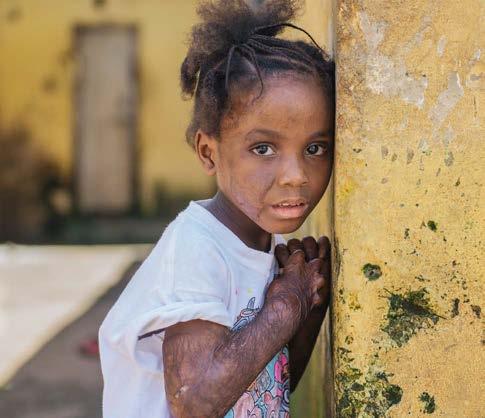
Through the expertise of Mercy Ships partner and former trainee, Dr. Raphiou Diallo, we were able to provide 69 surgeries in Guinea this year.
“Now I am a different woman,” Confort said. “I am filled with happiness that being hidden will not be Gamai’s future.”
In 2021, a few years after her surgery, Gamai’s father says his young daughter remains completely
full of life whether she’s helping around the house or dreaming of becoming the next president. “Before she was so weak... today she is so active. She can do movements that she couldn’t before. It was like she was in jail, but today I can say that she is free.”
Images: Gamai before and after surgery.
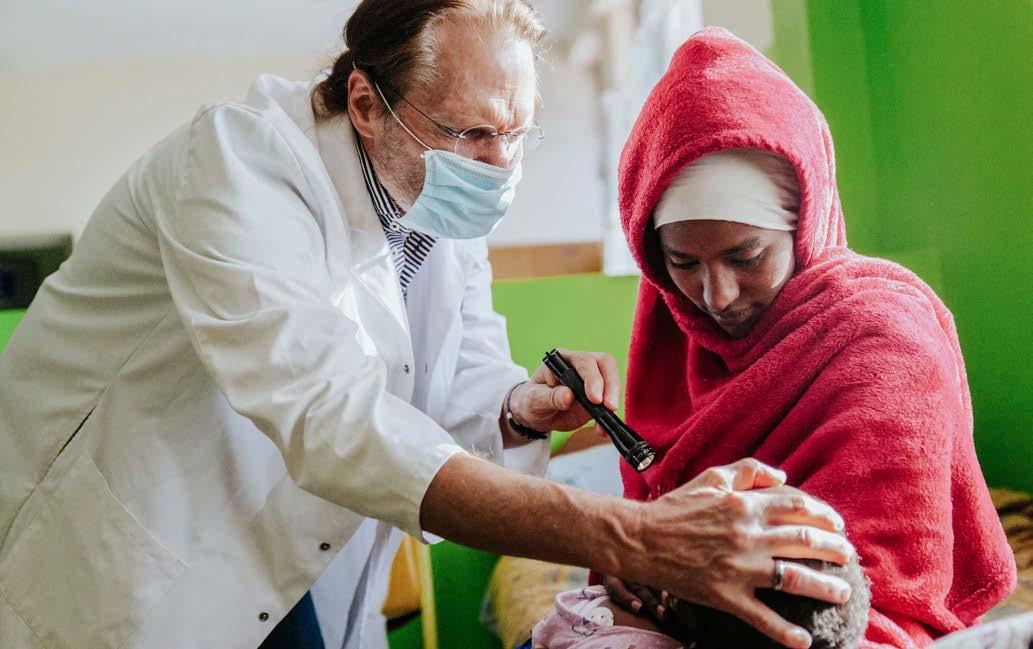
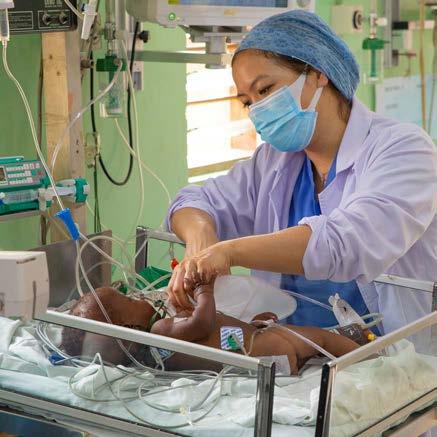
In 2021, Mercy Ships brought surgical care to patients in need of hope and healing in an exciting new way. Through a new partnership with CURE International, four long-term Mercy Ships volunteers offered life-changing care to patients in CURE hospitals in Uganda, Niger, Zambia, Ethiopia and Malawi for several weeks at a time.
Dr Tertius Venter and Dr Sarah Kwok were both thrilled to represent Mercy Ships and use their skills to serve in CURE hospitals. As a CURE volunteer, Dr Tertius spent several weeks in Niger and Ethiopia performing plastic reconstructive surgery on children as well as assisting with the mentoring and training of surgeons.
“I’m very impressed with the organisation and level of care that CURE brings to their patients,” said Dr Tertius. “I am grateful to God, Mercy Ships, and CURE for the opportunity to continue to serve God’s heart by serving the poor even under these unprecedented COVID pandemic circumstances. I’m blessed that I can pursue my call and reach out to those in need.”
Dr Sarah, who split her time between CURE hospitals in Uganda and Ethiopia, saw hope and healing come to life through this partnership. “The children often have complex neurological problems, which makes caring for them challenging. By walking alongside the team here, we are setting high standards of care and ensuring the patients get the very best they deserve. The team is transforming lives and giving patients a future filled with hope and expectations of a normal life.”
Mercy Ships partnered with CURE International by sending volunteers to five different CURE hospitals in Ethiopia, Malawi, Niger, Uganda, and Zambia. In addition to mentoring local healthcare professionals, Mercy Ships volunteers were able to perform a total of 266 surgeries:
Ethiopia:
34 orthopaedic surgeries
39 reconstructive plastics surgeries
Malawi:
6 reconstructive plastics surgeries
Niger:
56 reconstructive plastics surgeries
Uganda:
123 neurosurgeries
Zambia:
8 orthopaedic surgeries
Mercy Ships programmes continued in Madagascar and Sierra Leone, where we partnered with local nongovernmental organisation Freedom From Fistula. Through this partnership, we were able to fund surgical care, education, and empowerment for women suffering from an obstetric fistula.
An obstetric fistula occurs during an obstructed labour when emergency care is unavailable.
Women suffering from obstructed labour often struggle until the baby dies. During this agonising process loss of circulation causes tissue to die, leaving large gaps between the birth canal and bladder or rectum, causing incontinence. Most women and girls suffering with obstetric fistula are ostracised by their families and communities as they smell and are constantly wet. They must live as outcasts. Fistula is all but eradicated in the developed world. In contrast, it occurs to thousands of women and girls in Africa every day.
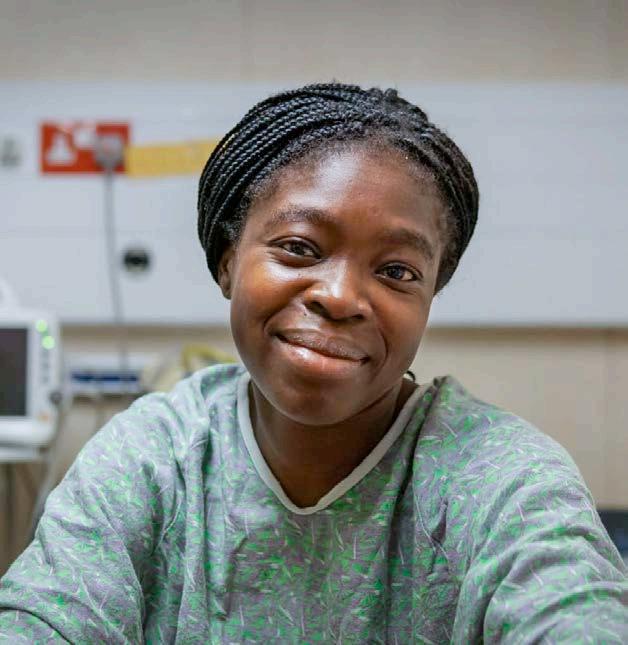
In South Africa, Mercy Ships focused on promoting mental health with an innovative new mental health training programme. Through the course, 105 local healthcare professionals learned practical and sustainable ways to promote better mental health among their patients. Parts of this course focused specifically on mental health among current prison inmates as well as their families.
In addition, Mercy Ships led several SAFE courses designed to promote safer surgery practices.
Meet one of our Heroes of Healthcare, Dr Gcobani Tuswa, a local surgeon who is transforming cataract care in South Africa.
When Dr Tuswa came to Mercy Ships in 2009, he received an intensive six-week training on the Manual Small Incision Cataract Surgery (MSICS), an effective and inexpensive procedure to treat cataracts.
The advantages of MSICS became evident to Dr Tuswa soon after his time with Mercy Ships: “When I came home to my hometown, Mthatha, I started working in a public hospital and they were cancelling surgeries because the hospital had a shortage of suturing material. And I said, no, we can do this with the MSICS… I showed them how this surgery works, and they were amazed. MSICS is now a standard cataract operation procedure at the Mthatha hospital. The four junior doctors that I worked with went to learn this procedure and became eye specialists as well. Now they are working in different places around the country.”
Dr Tuswa opened his own practice in 2020 — the only one in the area. “In the future I want to expand my practice. Hopefully I’ll be able to open operating theaters and find colleagues to work with. Then we’ll be able to help even more people and continue to fight the cataract problem in my country.”
135
11,627
Participants trained Participant training hours
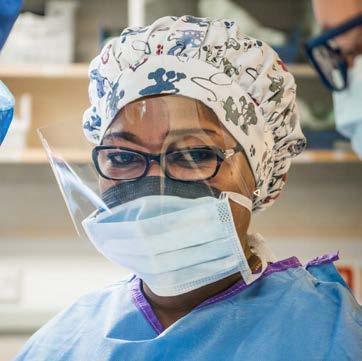
With flourishing projects in Benin throughout 2021, Mercy Ships was able to build upon years of partnership with the Ministry of Health and local healthcare professionals. Our projects in Benin this year included running an Essential Surgical Skills and Essential Pain Management course, in collaboration with Dr Odry Agbessi, former trainee and current partner of Mercy Ships. This year, Dr Agbessi was honoured with a 2021 Leadership Award by a Senegalese non-profit, Speak Up Africa, in recognition of her dedication to raising awareness to Africa’s pressing health issues.
Focused on promoting mental health with an innovative new mental health training programme.
Courses provided to participants:
Mental Health: 105
SAFE Obstetric Anaesthesia: 4
SAFE Obstetric Anaesthesia:
50,127
111 Participants trained Participant training hours
Courses provided to participants:
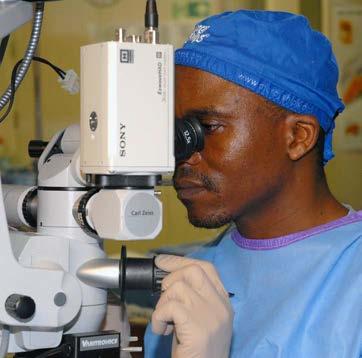
Nutritional Agriculture: 55 Essential Pain Management: 56
In Benin this year, we also ran a Food for Life training course and built a Food for Life training centre. The new regional campus will facilitate training for local agriculturalists to learn sustainable farming and agro pastoral practices, so they can rebuild, restore, and renew their land. The building of the Food for Life campus was in done in partnership with Phaz Compassion, led by Mercy Ships volunteer Eliphaz Essah.
“ This is really what I was looking to do in my life. Training young people to be self-dependent, transferring good techniques, and creating a relationship between health, nutrition, and also sustainable agriculture activities. This is something unique that I came across with Mercy Ships and it shaped my vision [for Food for Life].”
Eliphaz Essah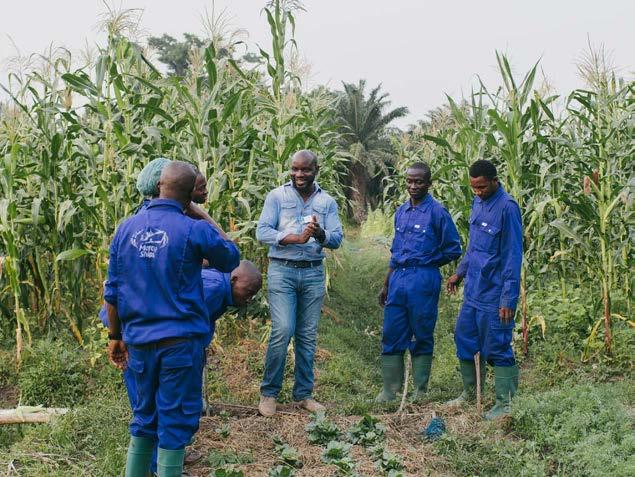
This year, we continued to build a solid talent pool of volunteer professionals to support operations of a two ship fleet. With the Africa Mercy returning to Senegal, and completion of the Global Mercy’s equipping and sail to join the Africa Mercy, the capacity for hope and healing will double — as will the need for volunteer crew.
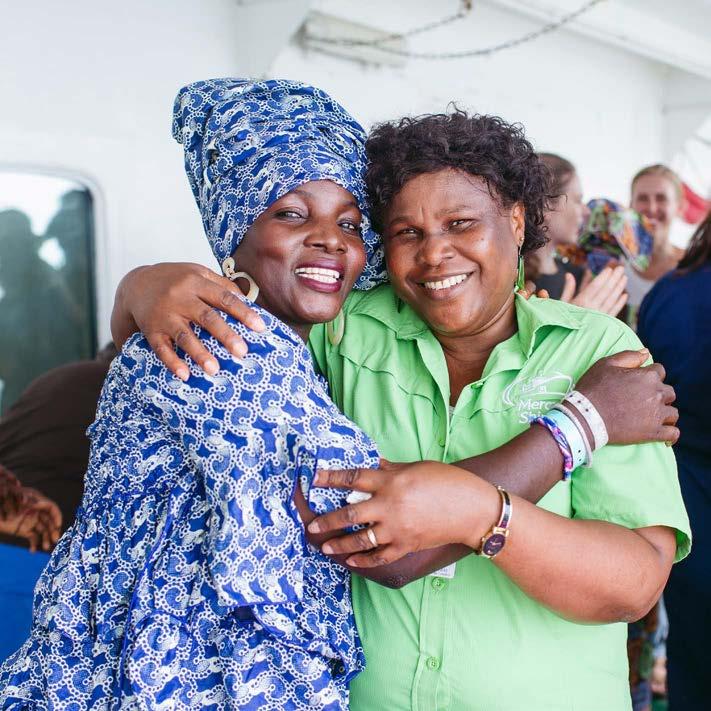
“Togo is my country, but Mercy Ships is my home.”
It was a conversation with her pastor, all the way back in 1995, that changed the trajectory of Clementine’s life. Clementine was working at her church when she heard that a hospital ship would soon be arriving in her home country of Togo. She was immediately intrigued — enough to leave her job to serve on board as a local day crew.
Almost two years later, Mercy Ships founder Don Stephens asked Clementine to step into a newly created role ministering to patients. She was recruited to serve for five months — and 23 years later, Clementine is still on board.
In 2020, Clementine took a brief leave of absence from the Africa Mercy to travel back to Togo and visit her family. One week before her return to the ship, where she had left all her belongings, she learned that a pandemic was quickly sweeping the globe. Travel came to a halt.
As weeks turned to months and then a year, Clementine continued to live out her faith joyfully every day in Togo. A former Mercy Ships trainee, Dr Wodomé, asked Clementine if she would be willing to serve in a ministry role in the clinic. It was an easy yes. Every morning, Clementine comes to the clinic and meets all of the patients. With her signature glowing smile, she leads devotionals, calms fears, and prays for each patient before they go into the operating room. As soon as possible, Clementine plans to return to her ship home. After spending time filling vital needs on the Africa Mercy she will embark on a new adventure as hospital chaplain on board the Global Mercy
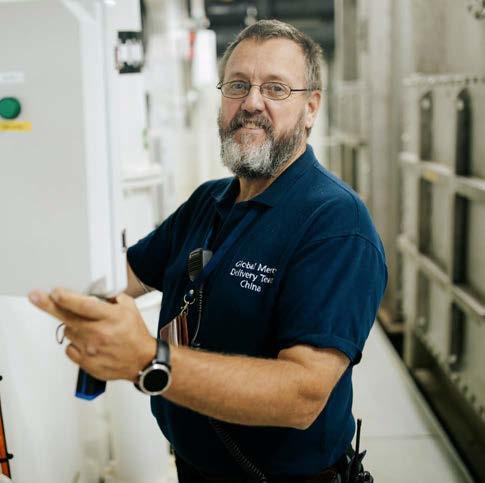
Renier Marx, from South Africa, first heard about Mercy Ships and the mission of bringing hope and healing back in the late 1990s, but it was many years before he and his family came aboard.
Renier, his wife Evilin, and their three children joined Mercy Ships as crew in 2011 and moved on board the Africa Mercy.
When asked what kept him on board all these years, Renier jokingly said, “Once you drink the water for more than two weeks, you’re stuck here!”
In addition to applying his passions to meaningful work, Renier loves serving alongside his family. Evilin, an outpatient nurse, and their children, students in the school, all had their place to thrive.
“On board, you can be here with your family, and everyone’s working toward the same goal. It drives us. We’ve all got the same common goal,” said Renier.
After years of serving aboard the Africa Mercy, Renier was invited to take part in a new challenge with Mercy Ships. Along with his family, Renier has spent the past five years living in a hotel in China to help guide the build of the Global Mercy as a project engineer.
Now, as Chief Electrician onboard the Global Mercy, Renier Marx jokes that his job is amazingly simple — it’s all about keeping the lights on.
One of Renier’s favorite parts of being onboard the Global Mercy is the diverse crew from around the world that he gets to meet, saying that diversity onboard a Mercy Ship makes it truly unique:
“We’re so diverse, and everyone comes with their unique skills and experiences. We all bring a little color to the ship.”
For Captain Taylor Perez, making his mark means serving as the first Captain of the Global Mercy. In this new role, Captain Taylor is pioneering a historic new wave for the organisation: “This is where I feel called right now. I have confidence about that.”
Captain Taylor was first introduced to Mercy Ships in 1984, when his ship docked near a previous Mercy Ship, the Anastasis. This chance meeting that captured Captain Taylor’s heart. Since then, he has captained every single one of the Mercy Ships fleet at one point or another.
During a particularly challenging season, Captain Taylor’s stability was needed more than ever. Captain Taylor was at the helm during our field service in Senegal when the COVID-19 pandemic broke.
Captain Taylor decided to bring a smile to people’s faces by taking on many different roles. You’d expect to see the captain in the bridge — but what about behind the coffee bar? Deciding to embrace the unofficial side job title of barista, Captain Taylor spent his free time volunteering in the café on board.
At the end of the day, Captain Taylor knows he’s where he is meant to be during this pivotal moment in Mercy Ships history. “If you want to be stretched and make an impact in the world, this is an amazing place to do it. You are impacting lives in an incredible way.”
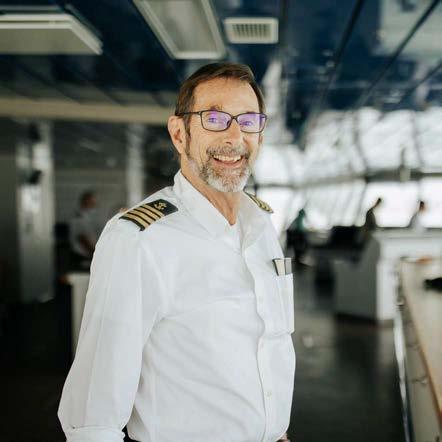
Grandmother of three, Moira Munro from Aberdeen, recently returned from volunteering on the Global Mercy. But it’s not the first time the intrepid 69-year-old has upped sticks and given her time freely for Mercy Ships, this was her eighth time serving.
Listening to the car radio on the way home from a late-night shift completely changed Moira Munro’s life.
“There were interviews from the ship and I was immediately interested. I had to apply,” she said.
Before she knew it, it was 5th November 2004 and she was arriving in Benin at night to volunteer onboard the Anastasis.
“I thought, what on earth am I doing? When I looked out of the window, there were no streetlights. I knew no-one! I must admit, I was petrified.”
But before long, she had befriended a German girl sharing her cabin, met patients and was overwhelmed by what she witnessed onboard – experiences that would see her compelled to volunteer time and time again.
Moira recalled her first time on board, “I remember early on seeing these two teenage boys next to each other on the ward. They had come in with cleft lips and they were looking at the mirror in our hands and their reaction was like nothing I had seen before. It had changed their lives completely!
The overwhelming impact she has seen while volunteering is something that keeps her coming back for more.
“People come in with huge tumours and cataracts – they literally come in blind and then they leave and they can see. It’s incredible to witness, to see their expressions and feel the transformation.
Moira is set to volunteer for her ninth service at the start 2022, and will return to the Global Mercy, where she served until November 2021 preparing it for serving in Senegal.
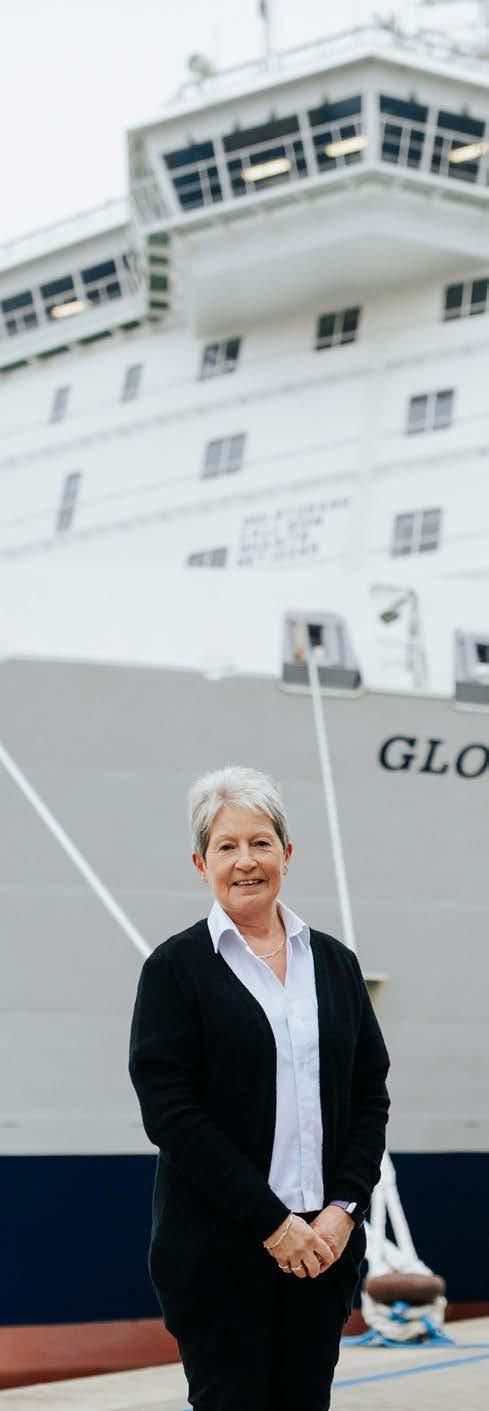
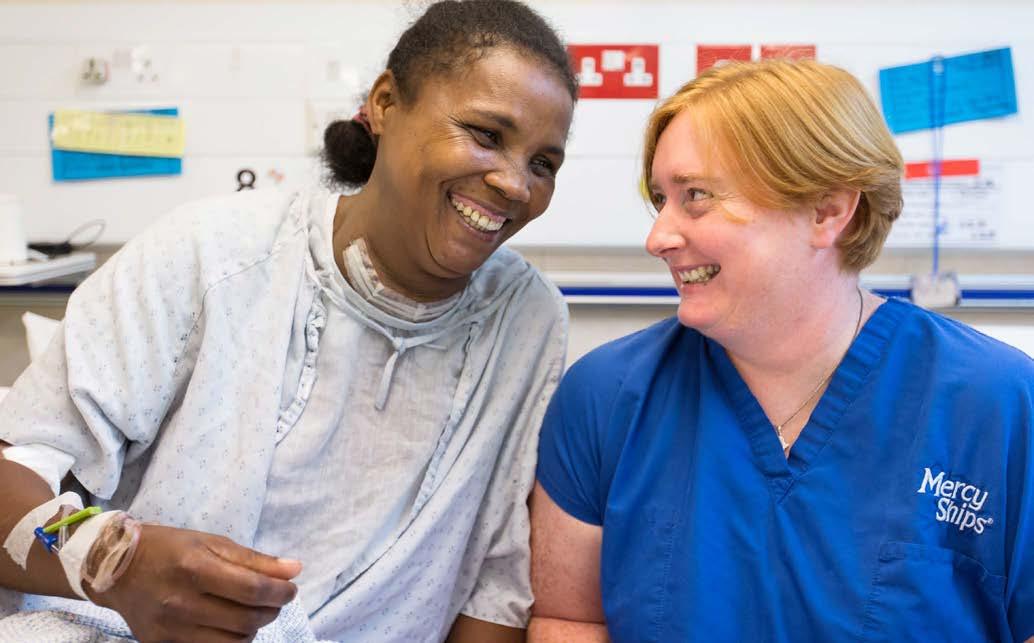
As a child, Jane White had a fierce dislike of both hospital and water. And yet, she chose a career path that combined both. And she isn’t even paid.
Jane, a nurse from County Down, Northern Ireland has volunteered onboard the Africa Mercy for the past decade, working tirelessly to provide life-enhancing and life-saving care to people across Central and West Africa.
“People come to Mercy Ships to serve and we are all in the same boat, literally.”
She still can’t stand water but sees working for Mercy Ships as a privilege. And despite remembering how she hated hospitals as a child, and initially being tempted by careers in agricultural studies and food science, she realised she was called to nursing.
Jane has worked in countries including Cameroon,
Sierra Leone, Guinea, Togo, Senegal and Liberia where she has witnessed transforming and life-saving care daily. As ward manager on the Africa Mercy, she has been in charge of around 80 people including ward nurses, outpatients, wound care and dieticians.
The difference between working for Mercy Ships and any hospital is the sense of camraderie; all the doctors and nurses knowing each others’ names and working for a common goal.
“I would love the model of here, and how everyone works onboard, to be how it is everywhere, in every job or walk of life. People come to Mercy Ships to serve and we are all in the same boat, literally.”
Jane is now on the Global Mercy and excited for what lays ahead.
She added: “If we can go in and do a little bit, even change the world for one person, then that makes a big difference. I love it.”
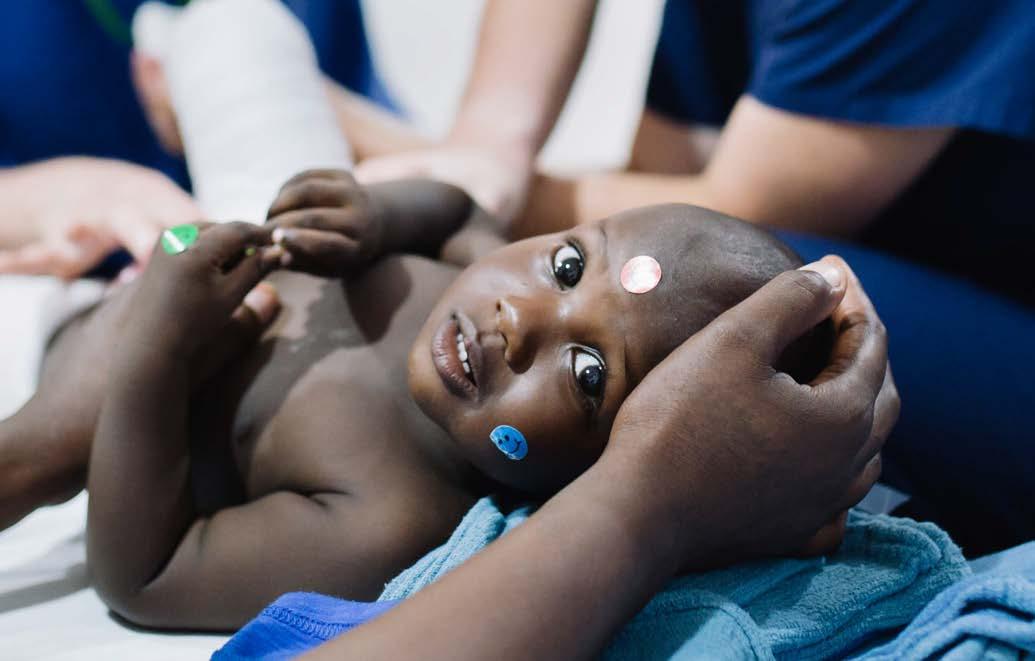
Mercy Ships UK saw its most successful year to date with income and volunteer crew applications at their highest levels yet. For a third consecutive year, Mercy Ships UK saw an increase in regular supporters and has seen many supporters commit to supporting our future work. This success was fueled by focused campaigns, quickly pivoting in the light of the pandemic to change our messaging and developing new partnerships that allow the compelling story of the volunteer crew of the Africa Mercy and the passion and bravery of our patients to come to the fore.
Over the last five years, Mercy Ships UK has increased its income by 63% (2016: £5.7m 2021: £9.3m) with underlying non-legacy income growing 88% (2016: £4.0m, 2021: £7.5m).
Overall income for the year increased by 6% to £9.3m (2020: £8.8m). Legacy income increased by 9% to £1.8m (2020: £1.7m) representing 19% of income (2020: 19%); pointing to underlying growth in non-legacy income of 6% to £7.5m (2020: £7.1m).
Response to fundraising campaigns remained strong with many existing supporters giving additional or uplifted gifts across the year. The two areas negatively impacted by Covid-19 were our revenue directly from community groups and events. However, the growth of online events and our broadcast platforms resulted in additional donations from individuals.
2021 saw the completion of the construction of our new ship, the Global Mercy, and restricted Global Mercy Construction donations reduced by 47% to £0.8m (2020: £1.5m).
Mercy Ships UK spent a total of £6.7m (2020: £6.5m) in charitable expenditure to help bring accessible, free surgical care and medical treatment to those in unjust poverty and urgent need. This represents an increase in charitable expenditure of 3% to its highest level since
Mercy Ships UK was founded. The UK office has added additional resource to support volunteer recruitment and support, as well as providing staff to support the programmatic work led by our Global office. This yielded significant efficiencies and will impact future growth positively.
In preparation for the expansion of the Mercy Ships fleet, the Directors have retained a portion of the income to be spent on increasing operational delivery over the next field services and supporting the launch of the Global Mercy and refit of the Africa Mercy.
The Directors review the reserves policy annually. In recognition of the increased responsibilities the UK is undertaking towards the expanded fleet, the Directors require Mercy Ships UK to hold reserves to cover a minimum six months’ expenses, based on the annual budget as agreed by the Board (these should be covered by unrestricted reserves). Restricted funds are not included in the reserves policy, as the Directors have no discretion over how they are spent. If the Directors choose to designate funds, these will not be included in the reserves policy, as they are held for a designated purpose.
Free reserves of £5.5m represent c.6.5 months’ operating costs for the 2022 budget year.
At the end of 2021, total funds stood at £5.6m (2020: £4.8m). Restricted funds amounted to £0.007m at the end of 2021 (2020: £0.2m) and are subject to conditions imposed by donors or implied by the nature of an appeal.
Unrestricted funds are £5.5m of which £5.2m are free reserves.
We have set out above a review of the financial performance during the financial year and our reserves position at the year-end. We have adequate financial resources and have the structures in place to manage the business risks. In addition, our budgeting and forecasting processes have taken into consideration the current economic climate and its potential impact on both our various sources of income and expenditure. We have a reasonable expectation that we have adequate resources and control mechanisms to continue in operational existence for the foreseeable future. Further, we believe that there are no material uncertainties that may cast doubt on the charity’s ability to continue as a going concern. Therefore, we continue
to adopt the going concern basis of accounting in preparing the annual financial statements.
The risks which face the charity are detailed in its consolidated risk register, which the Directors keep under active review. Headline Risks in 2021 include:
1. The uncertainty of the full impact of COVID-19 and the outbreak of another pandemic in the future.
Mitigation – The impact of Covid-19 has not yet had significant impact on revenue or ability to perform our charitable activities within the UK. However, the uncertainty in 2021 has been factored into the future plans and budgeting process. There is minimal risk to UK staff as the majority are able to successfully perform their role remotely.
2. A significant infectious outbreak in West Africa resurfaces causing a sudden change in operational plans.
Mitigation – Mercy Ships now works with up to 10 countries at a time developing future programmatic delivery, mentoring and training, as well as our surgical programmes. These plans are communicated to Mercy Ships UK regularly to ensure funding sources for various projects are in progress to ensure delivery is funded.
The Directors believe that appropriate policies to mitigate lower-level day-to-day risks have been adopted. They also believe that key financial systems are in place and appropriate internal controls are maintained for an organisation of the charity’s size and complexity. The overall financial and operational control environment is kept under regular review by the Chief Executive Officer and the Finance Director, with regular reports provided to the finance, audit and risk committee.
Mercy Ships UK is part of the global family of charities under the Mercy Ships banner and values. The International Support Centre of Mercy Ships Operations manages the charity’s marine and medical operations internationally. Alongside the UK, 15 other nations have a registered Mercy Ships charity. These partnerships are governed by an Association Agreement, which defines the operational and strategic links between the organisations, safeguarding the independence of the UK charity and its responsibilities for data protection, financial management, safeguarding and strategic operation.
Mercy Ships UK, company number 03147724 (England & Wales), is a company limited by guarantee and not having a share capital. Our registration number with the Charity Commission for England and Wales is 1053055 and with the Office of the Scottish Charity Regulator SC039743. The charity is governed by its Memorandum and Articles of Association dated 11 December 1995, and it was incorporated on 17 January 1996. The Memorandum and Articles of Association were revised in 2007. Under the conditions of the guarantee, members’ liability is restricted to £1 each. The number of members in 2021 was 9 (2020: 13).
The Board has ongoing regard to the public benefit guidance published by the Charity Commission when reviewing the charity’s activities and future plans. Mercy Ships continues to make a significant impact in numerous communities and on thousands of individual lives in Africa, both through surgical interventions carried out on the Africa Mercy, in onshore facilities, and through the lasting legacies left behind through extensive training and capacity building and as such funding provided by the UK is utilised exclusively to this end. Regular monitoring and reporting of projects is carried out to ensure that Mercy Ships continues to deliver world-class healthcare and is utilising funds in line with the wishes of donors in the UK.
Safeguarding
Mercy Ships UK appointed a Principal Safeguarding Officer in 2020 who oversees the implementation of
safeguarding measures across the whole organisation.
The Vice-Chair is the board lead for Safeguarding, HR and Volunteering as well as appointing external support from both a Safeguarding Charity and a Culture and Ethnic Inclusion Consultant. The Safeguarding Policy and procedures were reviewed in 2020 resulting in updated policies and procedures across the UK operation and globally. The board are confident these measures will continue to maintain the high standards of protecting the vulnerable and putting quality of care at the centre of all we do.
The Mercy Ships UK Board of Trustees is legally responsible for the overall control of the charity and for ensuring that it is properly managed.
The Board’s principal roles are:
A pproving the mission, strategies, high-level policies and annual business plan
A ppointing and overseeing the Chief Executive Officer
Monitoring performance and risk management
Reporting performance with integrity and transparency
Setting the vision and maintaining high standards of stewardship and values
Ensuring compliance with UK law and Charity Commission regulations
Managing its governance processes
Adding value by advising management
Representing the interests of Mercy Ships UK’s stakeholders.
The Board delegates responsibility for operational management to the Chief Executive Officer (the Principal Officer), who is responsible for developing the organisation’s plans, policies and processes, following Board advice and approval. The Executive Leadership Team made up of Finance Director, Director of Engagement, Director of Philanthropy and the Chief Executive Officer, support the leadership of the organisation’s strategic growth. Salaries of key personnel are benchmarked with external research and agreed by the Board of Directors.
Mercy Ships UK complies with the Fundraising Standards Board Requirements and is registered with the Fundraising Regulator, only utilising agencies that are compliant with these standards.
Mercy Ships does not solicit gifts by telephone or door to door acquisition methods, has received no complaints from any regulator and ensures that all donors receive only the communications they request.
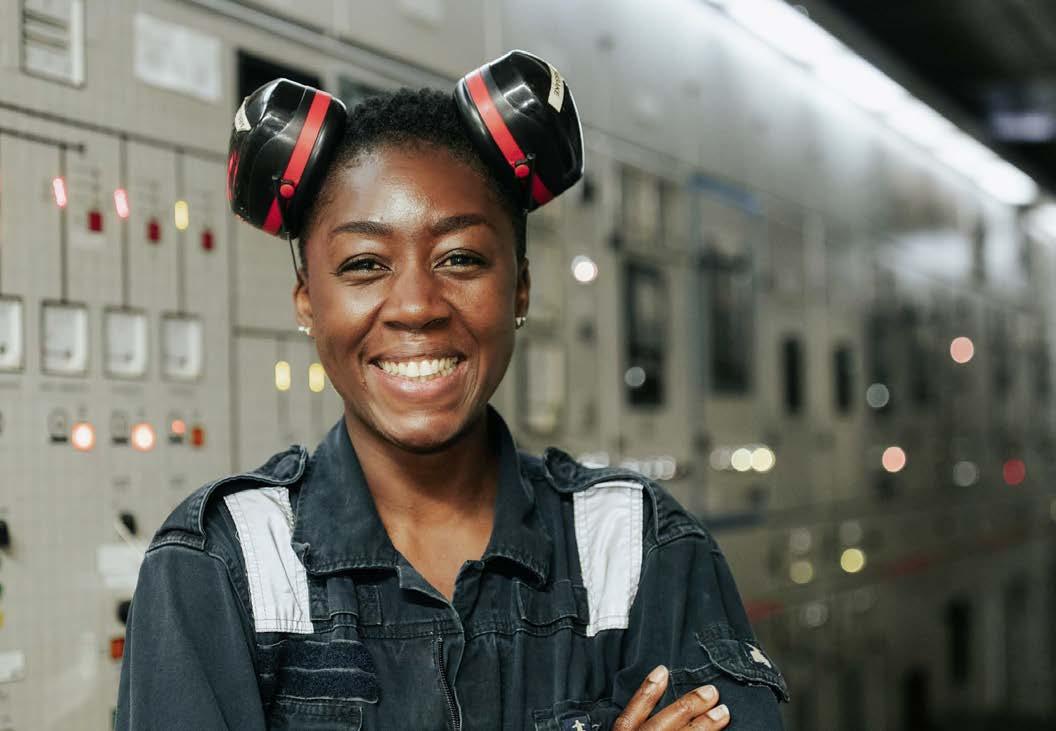
The Board comprises independent, unremunerated, non-executive directors (trustees) who have a broad range of skills and experience. Recognising the international collaboration of charities, Mercy Ships UK provides three Board members to the Mercy Ships International Board (total 39 members), and in return receives three members from the International Board as full Mercy Ships UK directors (total 10 members). As the Board continues to be strengthened and expanded, the directors are committed to the highest standards and encouraging applications from a diverse range of individuals.
Director recruitment, induction and training are overseen by the Nominations and Governance Review Committee.
No fees or remuneration are paid for serving as a Mercy Ships UK Board member. Mercy Ships UK reimburses reasonable expenses incurred in the course of acting as a director. This includes travel and accommodation expenses required to attend meetings, training and
orientation costs. Every effort is made to ensure costs are at a minimum.
The Board meets four times a year, with additional meetings as required. The Board has three subcommittees:
Finance, Audit and Risk Nominations and Governance Income Strategy
for the year ended 31 December 2021
The Directors are responsible for preparing the Directors’ Report and the financial statements in accordance with applicable law and regulations.
Company law requires the Directors to prepare financial statements for each financial year. Under that law, the Directors have elected to prepare the financial statements in accordance with Generally Accepted Accounting Practice in the UK (United Kingdom Accounting Standards and applicable law). Under company law, the Directors must not approve the financial statements unless they are satisfied that they give a true and fair view of the state of affairs of the company, and of the profit or loss of the company for that period. In preparing these financial statements, the Directors are required to:
select suitable accounting policies and then apply them consistently make judgements and estimates that are reasonable and prudent prepare the financial statements on the going concern basis unless it is inappropriate to presume that the charitable company will continue its activities
The Directors are responsible for keeping adequate accounting records that are sufficient to show and explain the company’s transactions, and disclose with reasonable accuracy at any time the financial position of the company and enable them to ensure that the financial statements comply with the Companies Act 2006. They are also responsible for safeguarding the assets of the company and that the assets are properly applied in accordance with charity law hence for taking reasonable steps for the prevention and detection of fraud and other irregularities.
The Directors have taken all steps that they ought to have taken in order to make themselves aware of any information relevant to the audit, establish that auditors are aware of that information and that there is no information relevant to the audit of which the charitable company’s auditors are unaware.
The Directors have prepared this report in accordance with the provisions applicable to companies subject to the small companies regime.
By order of the Board of Directors
 Henry Clarke, Chairman of Trustees
Henry Clarke, Chairman of Trustees
Total expenditure
Net income/ expenditure before other recognised gains and losses
Net realised gains/(loss) on investments
Net movement in funds before transfers
Transfers between funds
Net movement in funds
Total funds brought forward
Total funds carried forward
for the year ended 31 December 2021
The financial statements of Mercy Ships UK, company number 03147724, were approved by the Board of Directors on 25 March 2022.
for the year ended 31 December 2021
Net
Dividends, interest and rents from investments
Decrease/(increase) in debtors (Decrease)/increase

for the year ended 31 December 2021
The principal accounting policies adopted, judgements and key sources of estimation uncertainty in the preparation of the charity’s financial statements are as follows:
a. Basis of preparation
The financial statements have been prepared in accordance with the Accounting and Reporting by Charities: Statement of Recommended Practice applicable to charities preparing their accounts in accordance with the Financial Reporting Standard applicable in the UK and Republic of Ireland (FRS 102) (effective 1 January 2019) (Charities SORP (FRS 102)) and the Companies Act 2006.
The charity meets the definition of a public benefit entity under FRS 102. Assets and liabilities are initially recognised at historical cost or transaction value unless otherwise stated in the relevant accounting policy note. After making enquiries, the Trustees have reasonable expectation that the charity has adequate resources to continue its activities for the foreseeable future. Accordingly, they continue to adopt the going concern basis in preparing the Financial Statements
b. Income
All income is recognised in the Statement of Financial Activities when the charity is entitled to the income, has certainty of receipt and the amount can be quantified with reasonable accuracy.
Donated goods and services of medical equipment which are intended to be used to further Mercy Ships objectives are valued at market value and included in income when distributed or utilised.
Legacies are included as income when the charity is notified of an impending distribution or the date of receipt. Receipt of a legacy is only considered probable when the amount can be measured reliably and the charity has been notified of the executor’s intention to make a distribution. Where a legacy has been notified to the charity and the criteria for income recognition has not been met, then the legacy is treated as a contingent asset and disclosed if material.
c. Expenditure
Expenditure is accounted for on an accruals basis and is recognised when there is a legal or constructive obligation to pay. Where expenditure cannot be directly attributed to particular headings, it is allocated on a basis consistent with the use of the relevant resources measured by reference to staff time
Costs of generating funds relates to activities that are intended to generate income. The cost of fundraising campaigns is expensed in the year in which it is incurred although income derived from the initiatives may arise in future years
Charitable activities comprise of the following:
Grants payable from restricted and unrestricted funds for Mercy Ships’ programmes
Direct costs and Programme support costs incurred by UK–based staff in assisting programmes overseas, including staffing, volunteers and procurement
Governance costs relate to the direct management functions and support costs inherent in the activities of the charity. They provide the governance infrastructure which allows the charity to operate and to generate the information required for public accountability, and include the strategic planning processes that contribute to the future development of the charity
d. Tangible fixed assets and depreciation
Except for laptops and computer peripherals which are expensed on
acquisition, tangible fixed assets costing more than £1,000 (exc VAT) are capitalised.
Depreciation is provided on all tangible fixed assets at rates calculated to write off the cost less estimated residual value of each asset evenly over its estimated useful life as follows
Leashold Improvements 33% Office equipment and computers 33% Fixtures & Fittings 20% Motor Vehicles 20%
e. Intangible fixed assets and amortisation
Amortisation is provided on all intangible assets at 33% per annum to write off the cost evenly over its estimated useful life
f. Investments
Investments are initially recognised at their transaction value and subsequently stated at their fair value at the balance sheet date using the closing quoted market price. Income arising from investments is recognised as it arises. The statement of financial activities includes the net gains and losses arising on revaluation throughout the year.
g. Funds
Restricted funds are subject to conditions imposed by donors. Designated funds are amounts which have been put aside at the discretion of the Trustees.
The General fund comprises of accumulated surpluses less deficits after transfers to designated funds. It allows the charity to budget for anticipated commitments in the short and medium–term and to provide adequate working capital.
h. Pensions
The company operates a defined contribution pension scheme.
Contributions are charged to the Statement of Financial Activities as they become payable in accordance with the rules of the scheme
i. Stock
Merchandise stock is stated at the lower of cost and net realisable value.
j. Foreign exchange
Transactions denominated in foreign currency are translated into Sterling and recorded at the exchange rates ruling at the date of the transactions.
Monetary assets and liabilities denominated in a foreign currency are translated into Sterling at the exchange rates at the balance sheet date. Translation differences are dealt with in the Statement of Financial Activities
k. Leasing Commitments
Rentals paid under operating leases are charged to income as incurred.
l. Irrecoverable Value Added Taxation
The company is unable to recover the majority of Value Added Taxation charged on its purchases which is included in the related expense or asset in the accounts
m. Judgements in applying accounting policies and key sources of estimation uncertainty
In applying the charity’s accounting policies, the Trustees are required to make judgements, estimates and assumptions in determining the carrying amounts of assets and liabilities. The Trustees' judgements, estimates and assumptions are based on the best and most reliable evidence available at the time when the decisions are made, and are based on historical experience and other factors that are considered to be applicable. Due to inherent subjectivity involved in making such judgements, estimates and assumptions, the actual results and outcomes may differ. The estimates and underlying assumptions are reviewed on an ongoing basis. Revisions to accounting estimates are recognised in the period in which the estimate is revised, if the revision affects only that period, or in the period of the revision and future periods, if the revision affects both current and future periods. The key estimate and assumption made in these accounts are considered to be the recognition of legacy income as set out in note 1.b.
The cost of the statutory audit was £14,034 (2020: £11,520) which is shown within direct costs.
All grants made for Mercy Ships International programmes are made directly to Mercy Ships International or Mercy Ships Global Association.
Charitable expenditure includes total governance costs of £58,822 (2020: £22,268). This includes the cost of the statutory audit which was £14,034 (2020: £11,520).
At 31 December 2021 the charitable company had commitments under non–cancellable operating leases for buildings which expire:
The Directors received no remuneration for their services.
No directors received payment for professional or other services provided to the charitable company. No directors were reimbursed for travel and related costs (2020: £0).
The number of employees whose actual emoluments (including benefits in kind but excluding pension contributions) fell in the following bands:
£60,001
£70,001
Key personnel salaries for 2021 totalled £240,323 for 4 people (2020: £202,897 for 4 people)
The average number of employees in 2021 was 31.50 (2020: 22.75). The number of employees, calculated on a full time equivalent basis, analysed by activity was:
Mercy Ships International Board members: Lois Boyle, Henry Clarke, Anthony Dunnett (resigned 10th June 2021), Keith Thomson (resigned 18th March 2021), Dr Juliette Tuakli (resigned from the MSI Board 31st March 2021) and Dr Michelle White (appointed 1st December 2021).
Mercy Ships Operations (MSO), Thomas Stogner: Group CEO to 25th June 2021.
MSO transactions: MSUK recharged costs amounting to £548,624 (2020: £168,141) in respect of salaries for seconded staff.
£42,595 (2020: £0) was recharged by MSO.
Grants given to MSO Programmes £5,557,222 (2019: £5,391,495).
Mercy Ships Global Association (MSGA): Joanne Balaam, Delegate to the General Assembly.
MSGA: Grants made to MSGA amounted to £43,296 (2020: £43,084).
Personal donations amounting to £28,480 (2020: £3,470) were received from eight directors (2020: eight) in the year.
The investments held are in British government stocks and collective UK and global investments. They are managed by Rathbone Investment Management Ltd.
The following investments made up more than 5% of the portfolio at 31 December 2021:
We have audited the financial statements of Mercy Ships – U.K. Limited (the ‘charity’) for the year ended 31 December 2021 which comprise the Statement of Financial Activities, the Balance Sheet, Statement of Cash Flows and notes to the financial statements, including a summary of significant accounting policies. The financial reporting framework that has been applied in their preparation is applicable law and United Kingdom Accounting Standards, including FRS 102 “The Financial Reporting Standard applicable in the UK and Republic of Ireland” (United Kingdom Generally Accepted Accounting Practice).
In our opinion, the financial statements:
give a true and fair view of the state of the charity’s affairs as at 31 December 2020 and of its income and expenditure for the year then ended; have been properly prepared in accordance with United Kingdom Generally Accepted Accounting Practice; and have been prepared in accordance with the requirements of the Companies Act 2006.
We conducted our audit in accordance with International Standards on Auditing (UK) (ISAs (UK)) and applicable law. Our responsibilities under those standards are further described in the Auditor’s responsibilities for the audit of the financial statements section of our report. We are independent of the charity in accordance with the ethical requirements that are relevant to our audit of the financial statements in the UK, including the FRC’s Ethical Standard and we have fulfilled our other ethical responsibilities in accordance with these requirements. We believe that the audit evidence we have obtained is sufficient and appropriate to provide a basis for our opinion.
In auditing the financial statements, we have concluded that the trustees’ use of the going concern basis of accounting in the preparation of the financial statements is appropriate.
Based on the work we have performed, we have not identified any material uncertainties relating to events or conditions that, individually or collectively, may cast significant doubt on the charity's ability to continue as a going concern for a period of at least twelve months from when the financial statements are authorised for issue.
Our responsibilities and the responsibilities of the trustees with respect to going concern are described in the relevant sections of this report.
The other information comprises the information included in the annual report, other than the financial statements and our auditor’s report thereon. The trustees are responsible for the other information. Our opinion on the financial statements does not cover the other information and, except to the extent otherwise explicitly stated in our report, we do not express any form of assurance conclusion thereon.
In connection with our audit of the financial statements, our responsibility is to read the other information and, in doing so, consider whether the other information is materially inconsistent with the financial statements or our knowledge obtained in the course of the audit, or otherwise appears to be materially misstated. If we identify such material inconsistencies or apparent material misstatements, we are required to determine whether there is a material misstatement in the financial statements or a material misstatement of the other information. If, based on the work we have performed, we conclude that there is a material misstatement of this other information, we are required to report that fact.
We have nothing to report in this regard.
In our opinion, based on the work undertaken in the course of the audit:
the information given in the Trustees’ Report which includes the Directors’ Report prepared for the purposes of company law, for the financial year for which the financial statements are prepared is consistent with the financial statements; and the Directors’ Report included within the Trustees’ Report has been prepared in accordance with applicable legal requirements.
As a registered charity, Mercy Ships UK Limited is exempt from taxation on its income and gains to the extent that they are applied for its charitable purposes.
In light of the knowledge and understanding of the charity and its environment obtained in the course of the audit, we have not identified material misstatements the Directors’ Report included within the Trustees’ Report.
We have nothing to report in respect of the following matters in relation to which the Companies Act 2006 requires us to report to you if, in our opinion:
adequate and proper accounting records have not been kept, or returns adequate for our audit have not been received from branches not visited by us; or the financial statements are not in agreement with the accounting records and returns; or certain disclosures of trustees’ remuneration specified by law are not made; or
we have not received all the information and explanations we require for our audit; or the Trustees were not entitled to prepare the financial statements in accordance with the small companies regime take advantage of the small companies’ exemption in preparing the Trustees’ Report and from the requirement to prepare a Strategic Report.
As explained more fully in the trustees’ responsibilities statement set out on page 40, the trustees (who are also the directors of the charitable company for the purposes of company law) are responsible for the preparation of the financial statements and for being satisfied that they give a true and fair view, and for such internal control as the trustees determine is necessary to enable the preparation of financial statements that are free from material misstatement, whether due to fraud or error. In preparing the financial statements, the trustees are responsible for assessing the charity’s ability to continue as a going concern, disclosing, as applicable, matters related to going concern and using the going concern basis of accounting unless the trustees either intend to liquidate the charity or to cease operations, or have no realistic alternative but to do so.
Our objectives are to obtain reasonable assurance about whether the financial statements as a whole are free from material misstatement, whether due to fraud or error, and to issue an auditor’s report that includes our opinion. Reasonable assurance is a high level of assurance but is not a guarantee that an audit conducted in accordance with ISAs (UK) will always detect a material misstatement when it exists. Misstatements can arise from fraud or error and are considered material if, individually or in the aggregate, they could reasonably be expected to influence the economic decisions of users taken on the basis of the financial statements.
Irregularities, including fraud, are instances of non-compliance with laws and regulations. We design procedures in line with our responsibilities, outlined above, to detect material misstatements in respect of irregularities, including fraud. Based on our understanding of the charity and its activities, we identified that the principal risks of non-compliance with laws and regulations related to the Charities Act 2011, the Charities Statement of Recommended Practice, UK tax legislation, pensions legislation, employment regulation and health and safety regulation, anti-bribery, corruption and fraud, money laundering and we considered the extent to which non-compliance might have a material effect on the financial statements. We also considered those laws and regulations that have a direct impact on the preparation of the financial statements, such as the Companies Act 2006.
We evaluated the trustees’ and management’s incentives and opportunities for fraudulent manipulation of the financial statements (including the risk of override of controls) and determined that the principal risks were related to posting manual journal entries to manipulate financial performance, management bias through judgements and assumptions in significant accounting estimates, in particular in relation to use of restricted funds, and significant one-off or unusual transactions.
Our audit procedures were designed to respond to those identified risks, including non-compliance with laws and regulations (irregularities) and fraud that are material to the financial statements. Our audit procedures included but were not limited to:
Discussing with the trustees and management their policies and procedures regarding compliance with laws and regulations; Communicating identified laws and regulations throughout our engagement team and remaining alert to any indications of noncompliance throughout our audit; and
Considering the risk of acts by the charity which were contrary to applicable laws and regulations, including fraud. Our audit procedures in relation to fraud included but were not limited to:
Making enquiries of the trustees and management on whether they had knowledge of any actual, suspected or alleged fraud;
Gaining an understanding of the internal controls established to mitigate risks related to fraud; Discussing amongst the engagement team the risks of fraud; and
Addressing the risks of fraud through management override of controls by performing journal entry testing.
There are inherent limitations in the audit procedures described above and the primary responsibility for the prevention and detection of irregularities including fraud rests with management. As with any audit, there remained a risk of non-detection of irregularities, as these may involve collusion, forgery, intentional omissions, misrepresentations or the override of internal controls. A further description of our responsibilities for the audit of the financial statements is located on the Financial Reporting Council’s website at www.frc.org.uk/auditorsresponsibilities. This description forms part of our auditor’s report.
This report is made solely to the charity’s members as a body in accordance with Chapter 3 of Part 16 of the Companies Act 2006. Our audit work has been undertaken so that we might state to the charity’s members those matters we are required to state to them in an auditor’s report and for no other purpose. To the fullest extent permitted by law, we do not accept or assume responsibility to anyone other than the charity and the charity’s members as a body for our audit work, for this report, or for the opinions we have formed.

Jonathan Marchant (Senior Statutory Auditor) for and on behalf of Mazars LLP
Chartered Accountants and Statutory Auditor
90 Victoria Street, Bristol, BS1 9DP
Date: 25th March 2022
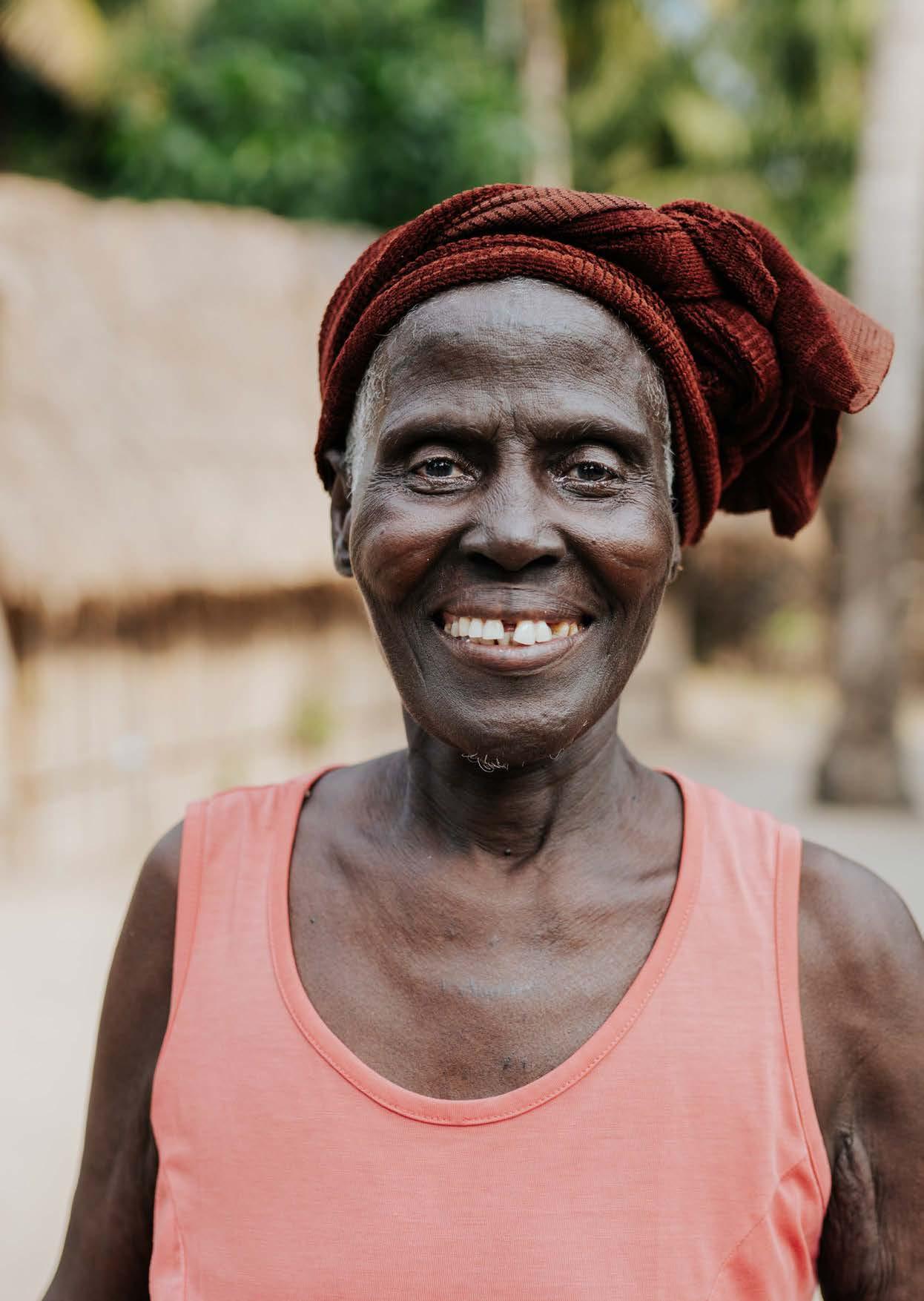
Directors
Ade Adeyemi (appointed 4th January 2022)
Andrew Billington (resigned 18th March 2021)
Lois Boyle (Vice Chairman)
Dr Leo Cheng
Henry Clarke (Chairman)
Anthony Dunnett CBE (Vice Chairman – resigned 10th June 2021)
Peter Ewins (resigned 16th September 2021)
Angharad Milenkovic
Paul Ramsbottom OBE
Thomas Stogner (resigned 25th June 2021)
Dr Juliette Tuakli
Naiomi Thalayasingam
Dr Keith Thomson (resigned 18th March 2021)
Dr Michelle White (appointed 1st December 2021)
David Mel Zuydam
UK patrons
Sir John Major KG CH
Dame Norma Major DBE
Honorary Treasurer
Peter Ewins (resigned 16th September 2021)
David Mel Zuydam (acting – appointed 16th September 2021)
Chief Executive Officer
Joanne Balaam
Registered and Principal Office
The Lighthouse, 12 Meadway Court, Stevenage SG1 2EF
Auditor
Mazars LLP, 90 Victoria Street, Bristol BS1 6DP
Banker
Bank of Scotland, 300 Lawnmarket, Edinburgh EH1 2PH
Solicitor
Clyde & Co LLP, St Botolph Building, 138 Houndsditch, London EC3A 7AR
Investment adviser
Rathbone Investment Management Ltd, 8 Finsbury Circus, London EC2M 7AZ
Company No: 3147724 (England & Wales)
Registered Charity No: 1053055
Registered Charity in Scotland No: SC039743
The
of
Ships is only made possible by the generosity of supporters and volunteers.
Nominate Mercy Ships as Charity of the Year partner in your workplace, school, church, or organisation.